Why strike? What’s driving teachers to take action? See page 21.
Problems with phonics
Unwise reliance on preferred reading methods. See page 29.
March/ April 2023 STRIKE!
Photos and reports from 1 February strikes and rallies pages 6-9

magazine from the National Education Union Lifting Limits
down gender
24.
Your
Breaking
stereotypes. See page





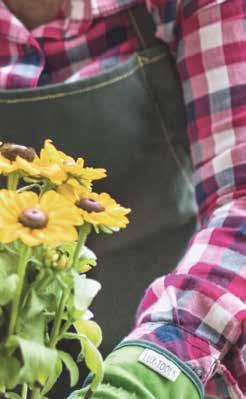














Educate March/April 2023
NEU president
Louise Atkinson
NEU joint general secretaries
Mary Bousted & Kevin Courtney
Editor Max Watson
Journalists
Sally Gillen, Emily Jenkins & Sarah Thompson
Newsdesk
t: 020 7380 4760
e: educate@neu.org.uk
Design & subbing Amanda Ellis
neu.org.uk
facebook.com/ nationaleducationunion
twitter.com/NEUnion
TO ADVERTISE IN EDUCATE
Display adverts
t: 020 7880 7614
e: educate-magazine@redactive.co.uk
Recruitment adverts
t: 020 7880 8542
e: educate-jobs@redactive.co.uk
Except where the NEU has formally negotiated agreements with companies as part of its services to members, inclusion of an advertisement in Educate does not imply any form of recommendation. While every effort is made to ensure the reliability of advertisers, the NEU cannot accept any liability for the quality of goods or services offered. Educate is printed by Walstead Bicester Ltd. Inside pages are printed on paper comprised of 100% recycled, post-consumer waste.
WHAT a day. What a message to the Government.
On 1 February, we held our first day of national strike action –action we never wanted to take but have been forced into, as the crisis in education deepens every day.
The Government thought we wouldn’t meet the inhibitive ballot thresholds. But you voted in your tens of thousands to stand up for education.
We held lively pickets up and down England and Wales with unprecedented levels of support.
The Government tried to paint our strike as unpopular. But parents backed us. A Mumsnet poll on the eve of our action showed 62 per cent were behind our strike. They know this is a just cause as they see teachers and support staff leaving classrooms in droves.

And we had 43,000 new members join our union in the two weeks between announcing our ballot results and the day of action on 1 February.
We held rallies across cities with unheard-of numbers. Town halls were filled to bursting with energy and enthusiasm from strikers across England and Wales.
You made me proud to be joint general secretary of our union in its finest hour.
And what creativity. Homemade placards and signs brought wry smiles to passers-by as teachers showed their originality and innovation. In this issue we report from the strikes on pages 6-9 with interviews and photos from Birmingham to Cardiff.
We could fill the magazine with photos alone, there were so many picket lines and demonstrations to cover.
The message to the Government is clear: we are not going anywhere. You must talk to us. Make us an offer: a fully funded, aboveinflation pay rise to address the recruitment and retention crisis and save our schools.
We also have a feature on Lifting Limits – which challenges gender stereotypes in schools with some good practice examples (see page 24).
And we interview a teacher who was racially assaulted last year (see page 18).
New members will be reading their first issue of Educate – enjoy the regular features, puzzles, commentary and cartoons. We hope you like it.
Mary Bousted National Education Union Joint general secretary

educate Your magazine from the National Education Union (NEU) 3
Welcome
Pay Up – Save Our Schools strike rally in London.
Your magazine from the National Education Union Lifting Limits Breaking down gender stereotypes. See page 24. Problems with phonics Unwise reliance on preferred reading methods. See page 29. Why strike? What’s driving teachers to take action? See page 21. March/ April 2023 STRIKE! Photos and reports from 1 February strikes and rallies pages 6-9
Photo by Rehan Jamil rehanwjamil
Helping your pupils learn about money

Managing money is a key skill that is essential for adult life. And providing financial education helps young people develop the knowledge, skills and attitudes they’ll need to manage their money, make informed financial decisions and achieve their goals.
At Young Enterprise, we want to help you build financially capable young people who are ready to thrive in today’s society. That’s why we offer a range of free opportunities to help you deliver fun and engaging lessons to your pupils, including:
• PROGRAMMES: Register for the free Money Heroes programme that brings learning about money to life in school and at home.
• PUBLICATIONS: Download the free Your Money Matters financial education textbook and help young people learn about saving, borrowing and student finance.
• CPD: Take part in a financial education free teacher training session to build your confidence, knowledge and skills.
• SUPPORT: Speak to our free advisory service for information and resources to help you deliver financial education in your classroom.

LEARN MORE AND SIGN-UP: YOUNG-ENTERPRISE.ORG.UK
The rest is history
25 March 1946
Blair Peach was born. Blair was a teacher and past president of the East London NUT who was killed on an anti-racist demonstration in Southall, London, on 23 April 1979, most probably by a Metropolitan Police officer. The NUT named an award after him to celebrate equality issues, which the NEU continues, and a primary school in Ealing also carries his name.
p24-27
18 Shabir Makim
Teacher suffers racist attack.

21 Why are NEU members striking? Educators share their reasons for taking a stand (below left).



24 Lifting Limits
Breaking down stereotypes (above).
29 Reading without comprehension
Focus on phonics is misguided (left).
Teaching assistant Charlotte Dee feels empowered (left).

Contents Regulars
Michael Rosen 35 Tim Sanders & Warwick Mansell 36 Ask the union 37 A class act 39 International 40 Jon Biddle & reviews 42 Teacher’s pet & letters 47 Photo opportunity & recipe 48 Crosswords & sudoku 50 Final word Features News
1 February strike News from our day of action: picket lines, rallies and demos.
SEND service threatened
to save legal
in Birmingham.
Alternative to exams
14
19 assessment.
Support staff conference First in-person event since Covid.
Bigger picture NEU projects Pay Up message onto DfE building.
Union
33
6
12
Fight
‘lifeline’
14
Gateshead event explores
to
16
17
19
people
News
20
in brief BiBC project; back-pay action; pay toolkit; future strike days.
“Gender stereotypes often go unnoticed.”
educate Your magazine from the National Education Union (NEU) 5 24 21 29 19
PHOTOS
Paul Greenwood
rehan jamil
Aled Llywelyn
kois miah
Stan Platt Jones
lee thomas
matt wilkinson
save our
LIVELY picket lines dotted England and Wales on 1 February as 300,000 teachers took part in the first national strike for 12 years. Support staff in Wales also took action.



Thousands of schools and colleges closed, some partially, as members at 23,400 workplaces took industrial action over the Government’s refusal to award an above-inflation, fully funded pay rise.
At demonstrations across the country, members were buoyed by the huge amount of public support. Honking car horns, cheers and applause kept members’ spirits high, but their message was serious: education is in crisis.

Years of below-inflation pay rises mean a teacher who started working in 2010 and has made normal progress up the pay scale has lost over £64,000 in real terms.

Toxic mix of low pay and excessive workload
But members were also clear that the strike was not simply about pay. It is one ingredient in a toxic mix of underfunding and excessive workload, all of which is fuelling a national teacher shortage. Fewer and fewer
SUPPORT STAFF IN WALES
Becky Draper (right) is a teaching assistant (TA) at Ysgol Plas Brondyffryn, an additional learning needs (ALN) school in Denbigh. Becky told Educate why she took strike action: “Classrooms across Wales could not function without their TAs or support staff. However, my pay does not reflect this – I have been in my job 19 years and my pay is a few hundred pounds more and I am at the top of what I can earn.
“The low standard of pay combined with the cost-of-living crisis means that the important role of TA isn’t attractive to newcomers, and therefore the children we work for suffer for it.”
educate Your magazine from the National Education Union (NEU) 6
Llanishen High School Cardiff
birmingham demo
wiltshire
Dale Street Methodist Church demo Leamington Spa
our schools
graduates are choosing teaching – the Government missed its recruitment target for new secondary school teachers by a staggering 41 per cent this year.
One in four teachers leave the profession after three years. Thousands upon thousands of experienced teachers and support staff are taking second – even third – jobs just to make ends meet. Many more have left, no longer able to afford to work in education, or manage the stress and exhaustion that has become part of the job.

Working weeks of 55 to 60 hours are commonplace. For those left in the profession, especially teachers in subjects where there are acute staff shortages, workload has increased.
Honking horns from passers-by
As they picketed on the cold, bright morning, members received huge support from passers-by, who honked their car horns in solidarity or joined picket lines.



Outside a school in Wiltshire, the deputy head told Educate: “No one wants to take industrial action, and it’s a sad day when you have to. But there comes a time when



educate Your magazine from the National Education Union (NEU) 7
to pages 8 and 9 for more STRIKE news
turn
Cardiff demo
take action Email your MP about the save our schools campaign
Liverpool demo
LONDON demo
LONDON demo
birmingham demo
Cardiff demo
LONDON demo
save our schools pay up
you have to recognise you can’t continue as you are.
“The challenges are unmanageable. Children deserve qualified teachers and those staff need to be paid properly – and support staff too. I hear from Welsh colleagues that recruiting support staff is even more challenging because of the requirement by some schools that they can speak Welsh. ”
‘Tons of support since 7.30am’
At Whitburn Church of England Academy, in Sunderland, rep Jane Wilson told Educate there were six picketers, who were joined by 18 supporters. In nearby South Shields, maths lead and rep Lisa Burrows said: “We have had tons of support – much more than we thought we would. We are on a busy road and there has been constant beeping since 7.30am.”
In the north west, about 30 members joined the picket outside Oasis
MediaCityUK, an academy in Salford, where rep Chris Bailey reported a “joyful and good-spirited” gathering, powered by coffee provided by the school’s community hub.
John Connolly, deputy head at William Brookes School in Shropshire, said he was striking because he is very concerned about the recruitment and retention crisis (see page 21).
He and another senior leader were among the 12 picketers. “One of the guys has got his van, so we are making tea and coffee in that, and support staff who are in school brought us some cake out,” said John.
Marching across the land
Led by NEU joint general secretary Mary Bousted, teachers joined a London march and rally, one of a number of demonstrations that began at 11am across the nation to protest against the Government’s proposed antistrike laws.



In solidarity with striking train drivers in ASLEF, civil servants in the PCS and university staff in the UCU, members were among 40,000 people who marched from Portland Place to Whitehall. A sea of NEU flags, banners and homemade placards was carried by predominantly young, female demonstrators and first-time strikers. London primary head teacher John Hayes, who closed his school for the day, took part, describing the atmosphere as “absolutely fantastic”.
‘Today has been brilliant’
In Leamington Spa, NEU joint general secretary Kevin Courtney joined the picket line at Myton School, where around 30 members were on strike. Three hundred people later attended a rally in the town.
NEU vice president and Warwickshire district secretary Emma Rose told Educate: “Today has been brilliant. We had a really
the word on the street
WENDY ALVERANGA (BELOW RIGHT)
”I’m working 11-hour days, plus we have more and more SEND children coming into the class that we don’t have the training or the capacity to deal with. This means that children without additional needs are suffering. So today it is important that we come out together and stand up for what’s right.”
PAUL ROBERTS (above right)
“This is my first time on strike and it feels great to have solidarity with colleagues and like-minded people. We’re on strike to ensure the Government passes on funding for teacher wage increases, to support funding for students in schools, and to make sure that our working conditions improve. It’s time for the Government to start funding schools and students.”
educate Your magazine from the National Education Union (NEU) 8
london demo
great turnout at our picket line at school, with loads of support from passing cars. People honking their horns and supporting us gave everybody a real lift.

“Having Kevin Courtney on the picket line with us gave our members a real boost. Because this isn’t just about London, it’s about members everywhere and having Kevin with us showed how much members across the country matter to the union. It felt great to be standing with him on such a historic day.”
Emma added: “If we cannot pay our teachers properly, if we cannot invest in education, then what are we as a country?”
“It’s really exciting to be on strike but also really important. I think it’s a much bigger issue than just pay. For me it’s about all kinds of conditions and the teacher retention crisis. So many students are being taught by loads of different cover staff. My message to the Government is: sort it out.”
NI ballots for action
BREAKING NEWS Wales action postponed
As Educate went to press, the NEU suspended a planned day of action in Wales on 14 February after talks with Welsh Government officials led to an improved pay offer. An additional award of 1.5 per cent this year was offered, plus a non-consolidated (a one-off payment) lump sum of 1.5 per cent. NEU joint general secretary Kevin Courtney said that while the offer remains “significantly below our members’ demands”, the union would consult on it. He added that the union would continue to seek an improved offer for support staff members. The action has been postponed until 2 March.
“I’m in my third year as an ECT and I love teaching. But you can see the effects the cuts are having on schools and the children we teach. This is my first strike and I’m proud to be part of my community, standing up for what’s right. We’re here for the children and their families. My message to the Government? Do better.”
In January, 64 per cent of NEU Northern Ireland (NI) members voted YES in an indicative ballot. Industrial action, including potential strikes, is now likely. Mark Langhammer, NEU NI regional secretary, said: “The NEU will talk, argue, negotiate, explain, research, rationalise and persuade until the cows come home, but the fact is, we’re facing a Government of philistines. It’s time to stand up, support your colleagues and stick with your union. Together, we’ll get through this.”

CATHERINE HUNTER (above)
“This is my first time on strike. It feels really sad that it’s come to this. We’ve got an Ofsted inspection tomorrow and yet we’re still here because this feels like an important message – schools are not getting enough funding. We literally don’t have pens, glue or paper. We buy so much stuff out of our own pockets. My message to the Government is: fund education better because there is money for it.”

educate Your magazine from the National Education Union (NEU) Oasis Academy MediaCityUK Salford
ANMIKA SALTER (left)
ROSA FORD (below right)
9
Engineering, Geography, Psychology and History








educate Your magazine from the National Education Union (NEU) 10 Oxford Cambridge and RSA
The public is with us as we fight the good fight
We won’t give up, NEU joint general secretary Kevin
Courtney.
WE were warned not to strike. It will “damage the reputation of the profession in the eyes of the public at a profoundly challenging time for many families”, former Education Secretary Kit Malthouse told us back in October as we prepared to ballot. Well, he was wrong.
On 1 February, teachers in England and Wales, along with support staff in Wales, went on strike for the first time in 12 years. Cheering, applause and car honking rang out across towns and cities, in a quite extraordinary display of public support. Passers-by joined our pickets, they listened sympathetically to what NEU members had to tell them.
18 letters, six squandered meetings
People on the street listened, while the Government has not. Over the past eight months we have written a total of 18 letters to four education secretaries (the fifth was in post for an absurdly brief 24 hours, allowing no time for communication either way), making plain the devastating impact of poor pay and its effects, along with workload, on recruitment and retention.
We have had six meetings. The last of them, just two days before the strike, where Gillian Keegan squandered yet another opportunity to resolve the dispute.
Never mind an offer of a fully funded, above-inflation pay rise – there was no offer of any kind.
That is despite our repeated warnings about the damage a five per cent pay rise (at the time it was awarded last summer inflation was 12.3 per cent) will do to teachers’ living standards, on top of years of below-inflation pay rises, and the strong link between poor pay and the worsening national teacher shortage.


The Government doesn’t need to take the union’s word for it that there is a crisis.
Its own figures provide the evidence. For example, its target for recruitment of new secondary school teachers was missed by a staggering 41 per cent this year. But ministers have not listened and so they must now accept responsibility for our action. It has showed us that the public believes in teachers, and in what they have to say about the dire state schools have been left in by years of underfunding, including of teacher pay rises.
Pupils suffer as teacher numbers tumble
In fact, NEU members didn’t share their own stories with members of the public on 1 February, because you believe your individual circumstances, although incredibly challenging, are less important than what is happening to the education system overall. Instead, it was the increasingly impossible job of trying to deliver the very best for children and young people with fewer and fewer teachers that you told people about.
At the same time, Gillian Keegan was on breakfast television talking about “future pay rises”, but refusing to commit to a better deal for this year. When will the crisis in our schools be treated with any degree of seriousness by this Education Secretary –or by any Education Secretary?
Our dispute will not end until Gillian Keegan begins negotiating. She has no choice. The Government can no longer assume vast sections of the country will take its side when there is national industrial action. It has been to the well once too often. Without voters onside, maintaining its position of no-negotiation will be impossible. The Government, which has operated so chaotically for so long, is simply unable to sell a story to the public that what our members are asking for is unreasonable.
Ignore us at your peril
It is important that we take heart from the huge amount of support we have, but also recognise it for what is – power. There were around 40,000 people from a number of unions who took part in the London demo on 1 February, and many thousands joined local demonstrations across England and Wales, powered by an energy and spirit I have never seen in my many years as a trade unionist. Our members’ message is cutting through. Gillian Keegan will ignore that at her peril. The public is with us, and our members have the strength and fight to strike until they get what they deserve and what schools desperately need. We won’t give up.
Opinion
educate Your magazine from the National Education Union (NEU) 11
NEU joint general secretary Kevin Courtney at Myton School Leamington Spa
PHOTO by Kois Miah
SEND legal ‘lifeline’ under threat in Birmingham
NEU members were among 80 protestors who demonstrated outside Birmingham City Council in January against plans to reform – and potentially outsource – an advocacy and legal advice service for parents of children with special educational needs and disabilities (SEND).

The SEND Information, Advice and Support Service (SENDIASS), which is funded by the council and supports families to challenge decisions about their child’s education or care, has been described as a “lifeline” by parents.
But they are concerned that a Government commissioner sent in to
overhaul the council’s SEND provision, after parts of it failed two Ofsted inspections, plans to cut SENDIASS.
Kate Taylor, an NEU rep and primary school teacher, whose son is autistic, said that while parents have been told the service will not be reduced, many in the process of mounting legal challenges have received emails saying their caseworker has left.

Kate told Educate that she had been supported by SENDIASS to challenge a decision over her 20-year-old son’s college place.
“It would have been impossible to legally challenge the council without SENDIASS. I know of people who have had to remortgage
their homes to fund cases. The legal fees can run into tens of thousands of pounds,” she said.
Kate added that with the help of the service she had been able to secure a place for her son at a college that fully meets his needs.
“He is much happier and more confident, and is being helped to develop socially,” she said. “He is even developing independent skills by getting the bus and is now thinking about maybe having his own place to live. He’s looking to the future.”
Around 500 children with SEND in Birmingham are not in school or only have a part-time place, she added.
Self-ID as disabled: you have nothing to lose and everything to gain
By Louise Moores (left), branch secretary, Middlesbrough NEU
AM I disabled? Is that a question you have ever asked yourself? What does it even mean to identify as disabled?
The Disability Act (2010) defines a disability as a physical or mental impairment which has a substantial and long-term adverse effect on a person’s ability to carry out normal day-to-day activities.
Impairments come in different shapes and sizes but all disabled education professionals have specific protection from discrimination at work.
Having been born with an invisible impairment, I’ve always identified as a disabled member. By meeting with other disabled members, I have become more active in the NEU and met lots of wonderful people. I was worried at first that, as my impairments were not visible, I might be quizzed or looked upon with suspicion as an imposter, but that couldn’t have been further from reality.
We don’t sit in groups playing Disability Top Trumps, trying to see who has the most impairments or faces the most barriers. Through our wonderful disabled network, we can talk and listen to each other’s lived experience and work together to remove barriers for all.
The NEU has adopted a model of self-identification for all disabled members,
and identifying as a disabled union member will never be disclosed to your employer by the union. There is no questionnaire or test, just support from fellow disabled members, conferences, CPD and a WhatsApp group. You can be involved as much or as little as you like, but checking your equality details and identifying as a disabled member will allow you to keep up to date with union groups and events that may be of interest.
Support from other disabled members has helped me through times when the barriers to living my life have seemed too big to overcome. I would urge everyone who has an impairment to check their equalities information and identify as disabled to the NEU. You have nothing to lose and everything to gain.
n Visit neu.org.uk/disability
educate Your magazine from the National Education Union (NEU) 12
News
Protestors – including NEU members – outside Birmingham City Council offices
Who will lead your union? Vote before 31 March
THE union is holding two important elections this term, when our members get to decide who leads and represents them at a national level.
The election for the NEU’s first single general secretary opened on 6 February and closes on 31 March. There are two candidates, Daniel Kebede and Niamh Sweeney (pictured), and whoever is successful will take over from Mary Bousted and Kevin Courtney in September.

The general secretary’s role includes:
n overall responsibility for the implementation of the strategic direction of the NEU, as set by the executive
n overall responsibility for all of the NEU staff and the union’s finances
n communicating to the Secretary of State for Education, and other political figures, the views and concerns of NEU members
n leading negotiations with the Department for Education
n representing the union, and its members, in public and in the media.
All members, other than associate and student members, who were in membership of the union on the date voting commenced, are eligible to vote.
The NEU’s national executive comprises
49 geographical members (in 17 electoral districts), three equality seat constituency
members and three sector seat constituency members. The executive is responsible for the governance, management and control of the union by rule. The elections will open on 7 April and close on 2 May.
All members, other than associate and student members, are eligible to vote in the elections for the geographical area seat-holders. In addition, members registered in the relevant employment categories (support staff, post-16 and independent) on the date the elections open will be eligible to vote in the elections for the three sector seat-holders.
Members who have indicated on their membership record/equality information that they are Black, disabled and/or LGBT+ by the date the elections open will be eligible to vote for the three equality seat-holders.
n If you have any queries about the elections, please email elections@neu.org.uk
MPs back our free school meals for all bill
By Ed Harlow, Haringey NEU district secretary

THE NEU joined dozens of MPs at an event in the Houses of Parliament to promote our free school meals (FSM) for all campaign.
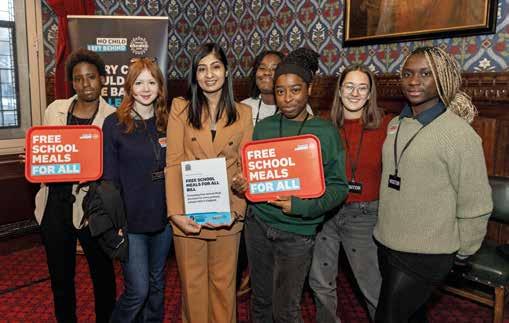
I was delighted to be able to speak about why the campaign is important to me.
Zarah Sultana MP proposed a tenminute rule bill that afternoon calling for FSM for all primary children. Introducing this bill will put pressure on the Government and opposition parties to make FSM universal. The NEU was pleased to partner with Zarah to build support among MPs for the campaign, which has been running since September 2022.
We know that for many children, their school meal may be the only hot meal they have each day. We know that hunger and poverty embed educational inequality at a young age. Hungry children cannot learn and universal FSM help to ensure that children have their basic needs met so they can thrive at school. Providing FSM to all primary age pupils will also remove the stigma some children feel around the entitlement.
Our FSM for all campaign has so far had great coverage in the national media,
and gained the support of more than 100 charities, community groups and faith organisations
Many MPs from all over the country joined us to pledge support. NEU joint general secretary Kevin Courtney also spoke, and he and MPs answered questions from pupils receiving FSM from schools in East London.
We look forward to working with MPs again to ensure that every child has a hot, nutritious meal in school, but this is just one part of the campaign.
We know we need to keep up the pressure in order to make sure that no child is left behind.
n Sign the open letter and contact your MP at freeschoolmealsforall.org.uk/take-action
educate Your magazine from the National Education Union (NEU) 13 LGBT+ podcast
A special Pride and Progress podcast discusses the NEU LGBT+ educators’ conference. Listen at apple.co/3HMndjZs
Zarah Sultana MP with young activists at the Houses of Parliament PHOTO by Vicki Couchman
Niamh Sweeney Daniel Kebede
‘Exams not working for pupils or business’
PARENTS, teachers, business representatives and politicians met in Gateshead in December to plan an alternative to the current system of exams.
The Beyond Exam Factories: A New Era for Secondary Assessment event brought together representatives from diverse groups to reflect on the case for change and develop plans to work collectively to make this a reality.
Organised by the NEU as part of its campaign for reform of 14 to 19 qualifications and assessment, the event heard how the present focus on end-of-course exams for GCSEs and A-levels is not working for students, universities or business.
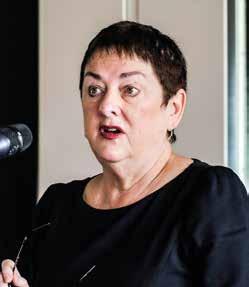
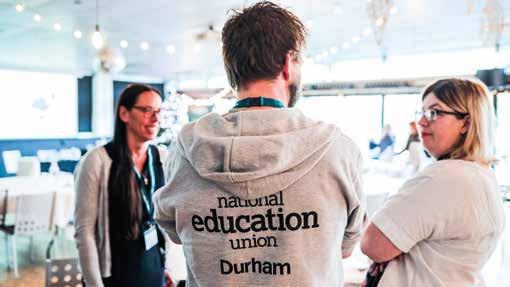
The cancellation of these exams during the pandemic highlighted problems with the system and there is growing support for reform.
NEU joint general secretary Mary Bousted spoke at the event, alongside Ian Mearns MP, Jamie Driscoll (North of Tyne Mayor), Dr Paul Campbell (Leicester University), Callum George (North East Chamber of Commerce) and Luke Myer (Institute for Public Policy Research North).
Mary said: “Exams can be a very reliable and effective form of assessment, but they are used inappropriately. We have an examdriven curriculum, where methods of teaching are corrupted by methods of assessment. Employers, parents and higher education institutions are unhappy with the system.”
OFSTED has misrepresented research findings and used irrelevant and out-of-date studies to promote ideas about what should be taught and how in a number of its subject reviews, NEU members heard.
Researchers and academics in subjects including maths and English voiced serious concerns about the reviews at a one-day conference hosted by the union.
The reviews, which have been published in ten subjects, are designed to inform curriculum leaders’ thinking. But individual researchers have complained to Ofsted about how their work has been used.
Opening the conference, chair and NEU head of policy Ken Jones said: “This day has been set up to test the knowledge claims made by Ofsted; to ask how extensive is its knowledge of the field it addresses; what is the strength of the evidence on which it rests its approval or disapproval; how sound are its judgements; and what are the implications for the work of teachers and for students’ experience of schooling.”
Journalist and Educate columnist Warwick Mansell said the inspectorate’s misrepresentation of research findings was “a national scandal”.
He added: “Ofsted’s motto is supposed to be raising standards, improving lives. I think it’s questionable how seriously it is taking that if it isn’t representing research fairly.”
Dr Ashley Compton, secretary of the Association of Mathematics Education Teachers, was among those to complain to Ofsted.

“At first sight, these reviews appear to support an evidence-based approach,” she said, but then added that some of the sources of research were “truly old”, citing one from 1988.
n Read more from Warwick Mansell on page 35
educate Your magazine from the National Education Union (NEU) 14
News
‘National scandal’ of Ofsted’s subject research reviews
NEU president Louise Atkinson with Nik Jones and Emma Parker, NEU Durham joint district secretaries. (Above right) Mary Bousted PHOTOS by Stuart Boulton
Beth Farhat, NEU northern regional secretary
Take action now: Pay Up – Save Our Schools
Now is the time to ask politicians to back our campaign for a fully funded, above-inflation pay rise: payupsos.com/write-to-your-mp
New report highlights the dangers of a MAT system
A NEW report by the National Foundation for Educational Research (NFER) has concluded that the Government’s aim to make all schools join multi-academy trusts (MATs) by 2030 will “certainly” be missed. The report warns that rapid trust growth would involve huge cost, cause upheaval and risk creating issues for quality.
The Government’s White Paper published in 2022 set out an ambition for all schools to be part of a “strong” trust of ten or more schools, or 7,500 pupils, by 2030. But the NFER points out that “there is currently a lack of evidence on the optimal size of a trust for good pupil and financial outcomes” and that “research has shown that academisation alone does not necessarily improve school outcomes”.
While the Government remains committed to the aims of the White Paper, it
has scrapped its schools bill, removing a major lever for academisation.
The NFER report also confirms that appetite for academisation is weaker than ever. Just six per cent of councils responding to an NFER survey were in favour of all schools being moved into MATs, while more than half said their local maintained and standalone academy schools were opposed to joining MATs.
Fundamental problems with MATs
Mary Bousted, NEU joint general secretary, said: “This report makes clear that the Government’s stated ambition to get all schools into MATs by 2030 is totally unrealistic.
“The fact that the Government persists with this policy indicates that it is not at all concerned by the huge problems in the academies policy and the confusing and
fragmented schools landscape brought into being by the expansion of MATs.”
Mary added that there are fundamental problems with MATs, including issues with accountability, lack of staff and parent voice, and the ability of local authorities to co-ordinate services for those children who need support.
“The Government appears to have given up even the pretence that these problems will be addressed. Instead, it wants to find new ways to force schools into becoming part of a MAT in order to create a sense of momentum behind an academies policy that was already running out of steam.
“This cannot and should not be a priority for Government right now. The crises of recruitment and retention of teachers, and school and college underfunding, should be paramount,” she said.
Fire extinguishers at the ready for conference
AMONG the many festive TV treats on offer, you may have enjoyed the 2022 Christmas Lectures from the Royal Institution (Ri), broadcast on BBC Four in late December.

The 2022 lectures, with one of the world’s leading forensic investigators, Dame Sue Black, included trademark demonstrations and audience participation. Early viewing figures suggest they were as popular as the previous year’s lectures, which enjoyed the highest ratings for a decade.
But creating three seamless hours of primetime TV takes months of careful planning, and NEU members played a crucial role thanks to our formal partnership with the Ri, signed in October 2019.
With tickets to the lectures’ filming in the Ri’s theatre allocated through a Wimbledon-style ballot due to their popularity, the Ri also offers free tickets to schools in disadvantaged areas of the UK. This year, the NEU was able to help, linking the Ri up with reps at some schools that hadn’t engaged with the Ri before.
Feedback from the students shows that over 80 per cent felt their understanding of what scientists do had increased, while twothirds said they had a better understanding of science’s place in our lives. The Ri’s own
audience analysis indicates the highest ever levels of diversity, another area that the Ri is committed to progressing.
The NEU is looking forward to welcoming the Ri to our annual conference in April, when its professional science presenters will be showcasing CPD activities offered through
the Ri’s Science in Schools programme. Fire and explosions will be involved – risk assessments have been submitted…
n The 2022 Christmas Lectures will be available on BBC iPlayer until December, and on the Ri website with a back catalogue of lectures dating back to 1966. Visit rigb.org
educate Your magazine from the National Education Union (NEU) 15
Dame Sue Black (left), who presented the Ri’s Christmas Lectures
PHOTO by Paul Wilkinson Photography
Register now for NEU leadership convention
THIS year, like the last few years, has been very demanding for those in leadership roles. It can be tempting to feel that identifying time to think, consolidate and learn is a luxury.
In spite of this, the union is inviting leaders to create a day to focus on themselves – by attending the leadership convention 2023. It takes place on Thursday 9 March at the Hilton DoubleTree Tower of London Hotel.
We’ll offer vital updates on issues such as funding, teacher retention and the pay campaign. We’ll try and inspire you with fresh ways to think about the complex challenges you face.
We offer, perhaps most importantly, the opportunity to have time with other senior leaders.
The convention will feature breakout sessions including:
n Tackling the retention challenges through life-friendly leadership
n Thinking about the needs of disadvantaged learners and how to empower them and your staff.
Our keynote speaker Dr Kenny Frederick, a founding member of the helpline Headrest, will talk about inclusive leadership and the courage to lead differently. She will draw on her extensive experience in schools and present some practical ideas.
The session will also cover the importance of wellbeing for you and your team, and how to support staff to promote positive behaviour and think about the effects of trauma.
This is a free event for NEU leadership members and registration is now open.
n Visit neu.org.uk/neu-leadership
ON Saturday 14 January, the NEU’s support staff conference was held in person for the first time since 2019.
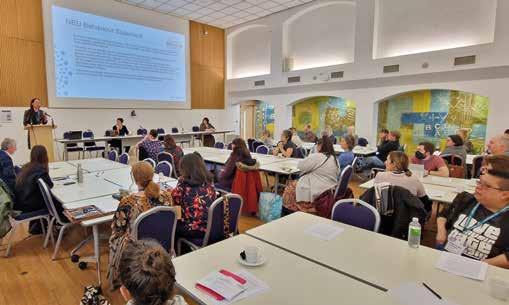
The atmosphere was one of solidarity and it was great to see support staff members once again being able to network with each other.
Conference was opened by NEU president Louise Atkinson, who spoke about her past experience working as a teaching assistant and as a teacher. She explained how hard it is to work in a class with no teaching assistant and still be able to support and include everyone.
Louise introduced NEU joint general secretary Mary Bousted, who praised the valuable job that support staff do and how vital they are to a school. She spoke about the increase in NEU support staff member numbers to over 50,000 members.
NEU Leadership
One of the highlights of the conference was the CPD on offer. There were five sessions: the curious case of ADHD – demystifying ADHD and common overlapping conditions; pregnancy and maternity rights – results from the NEU maternity survey; working with EAL and refugee children; it’s YOUR union: how to make sure your voice is heard; and assertiveness and positive behaviour management. The feedback from all sessions was positive.
Delegates also voted for a motion on the equal representation for support staff, which will be debated at annual conference in April.
It was a fantastic day – celebrating our amazing work and looking at the work that needs to be done to get support staff the recognition they deserve.
By Katie Harrison, teaching assistant, Edgewick Primary School, Coventry
Reps’ guidance for meetings with leadership
GUIDANCE for reps on including leadership members when planning in-person and remote member meetings has been published on the NEU website.
NEU meetings should be inclusive spaces where all members feel comfortable to express their views, the guidance says. It advises that leadership members should be mindful when they are making contributions in meetings that some members may be less
willing to challenge them given their seniority.
Reps are advised to consider establishing a set of agreed rules to give a clear message on behaviour. In addition, if a vote is taken on a collective position at a meeting not attended by leadership members, reps must ensure these members have an opportunity to vote or have their say via alternative means.
n Visit neu.org.uk/advice/leadersunion-meetings
educate Your magazine from the National Education Union (NEU) 16
NEU president Louise Atkinson speaking at the support staff conference
News
‘Fantastic day’ as support staff gather to celebrate their vital role

Bigger picture
THE NEU projected our message –Pay Up! Save Our Schools – above the entrance to the Department for Education’s building in Whitehall in the days leading up to our strike on 1 February.
Photo by Danny McKenzie
‘Everyone stand in unity’
Secondary school teacher
Shabir Makim tells Emily Jenkins of his traumatic experience being racially attacked.

“THIS traumatic event and the violent actions of the attacker have left me deeply scarred. There should be zero tolerance for this type of hate crime.”
Secondary teacher Shabir Makim from Manchester was the victim of a racist attack in July last year, when he was chased down the street by a former soldier brandishing two umbrellas, who used racist language and threatened to kill him.
“His intention was to gouge my eyes out, purely out of hate because of the colour of my skin. If it wasn’t for my fast reflexes that would have been the case,” says Shabir.
Shabir received blows to the head from the umbrellas, leading to concussion. Despite happening in broad daylight outside a local supermarket, no one from the public intervened during the attack.
“I felt so alone. All I could think of was my family,” says Shabir.
‘No justice if I hadn’t collected evidence myself’
His attacker, Robert Browne, a former soldier who later admitted to the racial assault in court, turned on Shabir after the teacher had begun filming an “aggressive” altercation between Mr Browne and a “vulnerable” homeless man, Shabir explains.
Shabir continued filming as Mr Browne attacked him with the ends of two umbrellas. After the incident he immediately called the nearby police station, but it was only after Shabir followed Mr Browne to a pub and showed the video to a passing police officer – more than two hours later – that his complaint was taken seriously by police and the attacker arrested.
“If I hadn’t filmed the incident and collected the evidence myself, this man would never have been brought to justice,” Shabir says.
Shabir shared the video with friends and family in his WhatsApp group and one of them posted it on social media, where it received 1.5 million views on Twitter.
No prison time so ‘behave how you wish’
In December, his attacker pleaded guilty to the racially aggravated assault and received a ten-week suspended sentence. This means he will not spend any time in custody unless he offends again within the following 18 months.
Shabir says he feels angry and heartbroken, and does not believe justice has been done: “What message does this give to those who share the same values as Robert Browne? Behave how you wish with people of colour and pick up litter for a short period of time?”
The attack has had a severe and long-term effect on Shabir’s mental health. He explains that he now feels unsafe going out, has lost his confidence and suffers from anxiety. But, he says, he also wants to use his experience to raise awareness of racism and hate crimes in this country and encourage his fellow educators to help spread messages of tolerance and community.
“Schools and teachers can have a massive sphere of influence in terms of reaching out to different members of the community, and can act like a hub where all these groups can work together to create a positive message,” he says.
Shabir also believes the law needs to change so that there is zero tolerance towards racism. “I believe everyone needs to stand in unity against racism,” he says. “From Government officials, heads of establishments and institutions, faith groups, right down to the men and women in our local communities. We cannot stay silent any longer about the evils of racism; we must speak up against it to rid this cancer from our society. Be the change you wish to see in the world.”
n Visit neu.org.uk/anti-racism-charter
n Visit neu.org.uk/anti-racism-education
educate Your magazine from the National Education Union (NEU) 18 Interview
News
feature
Shabir Makim
‘An instant feeling of togetherness’
Charlotte Dee is a teaching assistant and NEU rep at Compass Community School Coastal Park, a special needs school in Folkestone.

What do you love about your job?
I enjoy the challenges it presents. I feel that I’m helping the students in the best way possible for their individual circumstances in a therapeutic and child-centred way.
What do you love about being in the union?
When I joined the union, I felt an instant feeling of togetherness and understanding from my fellow NEU members. I was quickly voted as a rep for my school and got involved in all the NEU courses and conferences that were relevant, such as the women’s empowerment course and the independent sector conference.
This made me feel even more empowered as a teaching assistant and a union member because of the amazing experiences I have had and lasting friendships I have made.
What have you been up to lately?
I have recently been nominated as joint district secretary. I’ve also been setting everything up ready to go on my second Care4Calais delegation and preparing to attend annual conference as an independent sector delegate and a joint district secretary –an exciting opportunity.
What’s important to you right now?
Due to not being able to be involved with the strikes first hand, I’m focused on assisting my fellow independent union members, as well as continuing to aid the Care4Calais charity
by raising awareness and going on delegations with the union.
What do you do on your day off?
I play for the Ashford Women’s Rugby team, write and play music as an acoustic singer songwriter and go on camping holidays and hikes with my two dogs.
Tell us something we don’t know. I’m very excited about what more opportunities the NEU can give me.
Union people
educate Your magazine from the National Education Union (NEU) 19
“The amazing experiences and lasting friendships have made me feel more empowered.”
Charlotte Dee (above)
News in brief
NEU educators campaign for inclusive school curriculum
MOST teachers have introduced some elements of inclusiveness into their teaching practices, such as anti-racist education. They have done this by supporting an anti-racist policy through their actions or expressing an anti-racist idea. And we have teachers who have taken this further by decolonising the curriculum.
The NEU’s Black in the British Curriculum (BiBC) project celebrates and applauds all these teachers. BiBC was created by NEU educators to provide alternative narratives around the discussion of race. It focuses on developing an inclusive whole-school curriculum, helping pupils celebrate the multicultural nature of Britain and an understanding of the contributions that we all make to our society.
Our vision includes one that creates the space for all learners in schools, colleges and educational institutions to feel empowered by an inclusive curriculum. In addition, to campaign
and challenge all our examination bodies to begin to develop more appropriate resources and assessments. n Please email samuel.makinde@neu.org.uk to join or request more information.
Pay claim toolkit for independent members
THE NEU has launched a toolkit to help independent sector members make an annual pay claim.
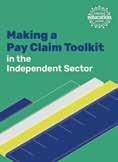
It has printable resources including a model pay claim, a staff survey and guidance on school finances and holding meetings with management. An interactive pay vs inflation calculator allows members to calculate how the rise in inflation has affected their pay in real terms.
The union recommends that all independent sector members submit a
collective pay claim, rather than waiting to be told what their pay award will be.
n Visit neu.org.uk/making-pay-claim
Support staff at UL primary strike over back-pay
SUPPORT staff at Salisbury Manor
Primary School, London, are taking strike action over a pay dispute with United Learning (UL).
The six women members took three days of strike action in January after UL refused to pay money the NEU believe is owed to them due to historical miscalculations identified by Waltham Forest local authority, which previously managed the school.
UL claims it is not liable for the payment, yet in other schools in Waltham Forest support staff members have been paid back-pay owed to them.
“We don’t want to strike, but it’s the only option left,” explained NEU rep Lorraine O’Hara. “It’s not like we’re paid a lot to begin with.”
Three more days of strike action are planned for after half term.
STRIKE DAYS
STRIKE DAYS SO FAR:
Wednesday, 1 February
Members in England and Wales
Tuesday, 14 February
Members in Wales
FUTURE STRIKE DAYS:
Tuesday, 28 February
Members in Northern, North West, Yorkshire & The Humber regions
Wednesday, 1 March
Members in East Midlands, West Midlands, Eastern regions
Thursday, 2 March
Members in London, South East, South West regions and Wales
Wednesday, 15 March
Members in England and Wales
Thursday, 16 March
Members in England and Wales
educate Your magazine from the National Education Union (NEU) 20
PAYUP
payupsos.com
POSTPONED
Why we are striking Feature
AHEAD of the national strike by educators in England and Wales on 1 February, NEU members who were among the 121,000 who voted for the action shared their reasons for taking a stand.
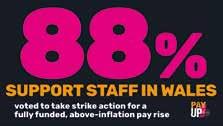

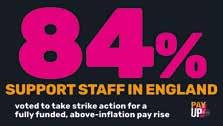
Rebecca Cann
a teacher for 18 years, based at a high school in Staffordshire

“I VOTED to strike for a number of reasons.
“One of them is that we need a fully funded pay rise. In the last 12 years, education has become a more and more toxic place to work. The Government’s approach to education has been to strip back everything for financial reasons, to try to make education appear profitable and attractive to investors. The experience of everyone who works in education is one of things just getting worse. That’s in the classroom, as well as in our own ability to pay the bills. It is hard to see the job as financially sustainable, never mind sustainable from a mental health point of view.
“My big concern is that the offer the Government has put in place is going to do nothing to stop people leaving education, making it harder for those of us still here, and making the education we can offer of a lower quality. We can’t recruit teachers. It is one of the least wellpaid graduate professions.
“I have looked at how much real-terms money I have lost over the last 12 years and it is more than £70,000. That’s how much worse off I am under this Government than I would have been if we had had pay rises that matched
inflation. I know of people who have been on the same pay point for five years because the school doesn’t have the budget for rises.
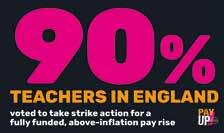
“My partner and I are both teachers. We are professionals, but every few months our home just feels more and more unaffordable. We are left with a series of terrible choices about what we can do to manage the bills. Our gas and electric bill has gone from £100 to £370 a month. Our food a year ago was around £60 a week – for a family of four – and now it’s about £100.
“We are finding it really hard, and everything we do seems to make it worse and create more debt. We need to strike. We need to push back.”
educate Your magazine from the National Education
(NEU) 21
Union
From the failure to recruit and retain teachers and the cost-of-living crisis, to underfunding and workload, Sally Gillen finds out the reasons why NEU members are striking.
continued from page 21
John Connolly a teacher for 23 years, is a deputy head at a school for 11- to 18-yearolds in Shropshire

“MY main reason for striking is that we are heading towards a teacher recruitment crisis.
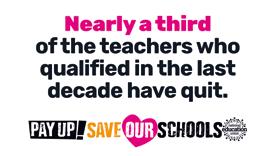

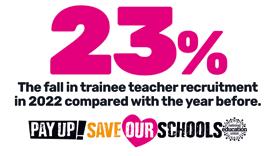
“If we don’t create a profession that is well respected and well paid, we won’t have enough teachers in our schools. We had a high staff turnover in the summer, and we had more staff leave at Christmas than ever before. There is a pattern of staff leaving before their time because they have had enough. Some are joining other schools, but quite a few of them are leaving teaching altogether and we had one member of staff who just quit with no job to go to.
“Often, we will have just one applicant for a job. Sometimes we don’t get any. We have several posts that are filled by supply staff, which increases workload for existing teachers who need to prepare lessons and resources for them. More experienced staff have to spend more time supporting those who are less experienced, such as
those who are newly qualified. It puts pressure on them.
“My fear is that within 18 months we may be looking at not having enough teaching staff for schools to run, so there could be shortened weeks. At my school we are not far off not being able to staff the curriculum. There are areas where we don’t have specialist teachers.
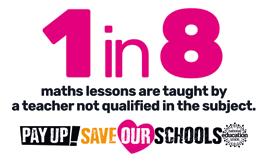
“I have never seen morale so low and I’ve never had as many teachers talk to me about early retirement and leaving the profession. It’s a constant topic of conversation among teachers, who are at breaking point because of the recruitment issues and all of the other things. There is this sense that we worked so hard during Covid, but none of that matters. It’s like it didn’t happen.”
Shaun Smith is a science teacher and has taught for 25 years
“WE are just not attracting people into teaching. It’s been a great profession for me and I strongly believe in it, but we’re just not getting people in because they are seeing it as a low-paid job.

“The expectations on teachers are enormous. What we are expected to do, on a daily basis, is enormous. As is the expectation that we are continually improving. We are professionals, and I agree with all that, but we want to be paid in accordance.
“What’s being asked of us is much more than working from 9am to 3.30pm and having long holidays. There is loads more to it. It is such a big job that we deserve better pay and we’re not getting the quality of people into teaching now. I do worry about that.
“My wife works in initial teacher training and I know that many people give up after three years. They go off to work abroad because they know they can earn lots more money. It’s just shocking.”
22 educate Your magazine from the National Education Union (NEU) Feature
“TEACHERS and educators in general deserve a pay rise that matches inflation. In recent years, workload has just gone up and up, and recruiting and retaining staff is quite difficult. In maths it’s particularly difficult.
“In my last school we had a couple of teachers leave at Christmas and at Easter and we just couldn’t replace them. We had some classes on longterm supply cover. Sometimes it would be a maths teacher we would get for a few months from an agency, but they would change so the kids didn’t get to know them. Sometimes they weren’t even a maths teacher and the quality of education those pupils received definitely suffered.
“Sometimes a parent would
Andrea Jackson
“I DO three jobs to cope. When I finish work, I then tutor until 7pm every weekday night and weekends and then I have to mark exams as well just to keep my head above water. I shouldn’t have to do that. I am furious. I shouldn’t be in this position at nearly 50.
“Because I live in the south east, the cost of living is very high. The last holiday I went on with my children was in 2007. Over the last ten years the crunch has affected everyone.

“Some of my colleagues, who are in their 40s and single, have had to go back to live with their parents. They can’t afford to have their own home. Also, if you have children and you are single that makes life really difficult.
“One of the reasons I’m going on strike is because new staff come in, we train them, and they are gone within five years. One of the issues for them is the workload and also that they can’t afford to be self-
sufficient. This is a profession and they have earned their degrees, but their peers, after four or five years, start to overtake them financially, so they don’t stick at teaching.
“At one time, a teaching post would attract five or six applicants. Now you can’t get anyone to interview. On paper, mine is the best school in Milton Keynes and we are struggling to recruit, particularly science teachers.

“I’ve been teaching a long time. I love children and I enjoy my job, otherwise I wouldn’t have coped and I’d have left. But I work on average 55 to 60 hours a week – what we are paid just does not equate with that.
“I don’t know how young staff cope. Morale is low. Staff are so tired. I don’t have a work-life balance. It is important that we strike, in terms of recruitment and retention. The older staff are going, so who’s going to be left?”
mention it, but actually I was surprised at how infrequently parents did mention it. I like to think that if this had happened to me when I was at school that my mum would have complained. But even if there is a complaint there is not much that can be done.
“At my last school, we would put out adverts and no one would apply. It impacted me because I was co-ordinating the year 7 scheme of work so I would prepare resources for the cover teacher and every couple of weeks we would have a new teacher in and would have to show them where all the resources were. So it definitely increased my workload.
“I think it’s really important
that whatever the pay offer is, it’s fully funded. If not, it’s just a cut to education funding overall. Striking is really not something we are doing selfishly. We are doing it for the future of education.”
educate Your magazine from the National Education Union (NEU) 23
Charlotte Mcfarlan
is a maths teacher in south London and has been teaching for six years
Feature
a teacher at a secondary school in Milton Keynes, has been teaching since 1997
Feature
Packmoor Ormiston Academy, Stoke-on-Trent, which has been working to tackle gender sterotypes
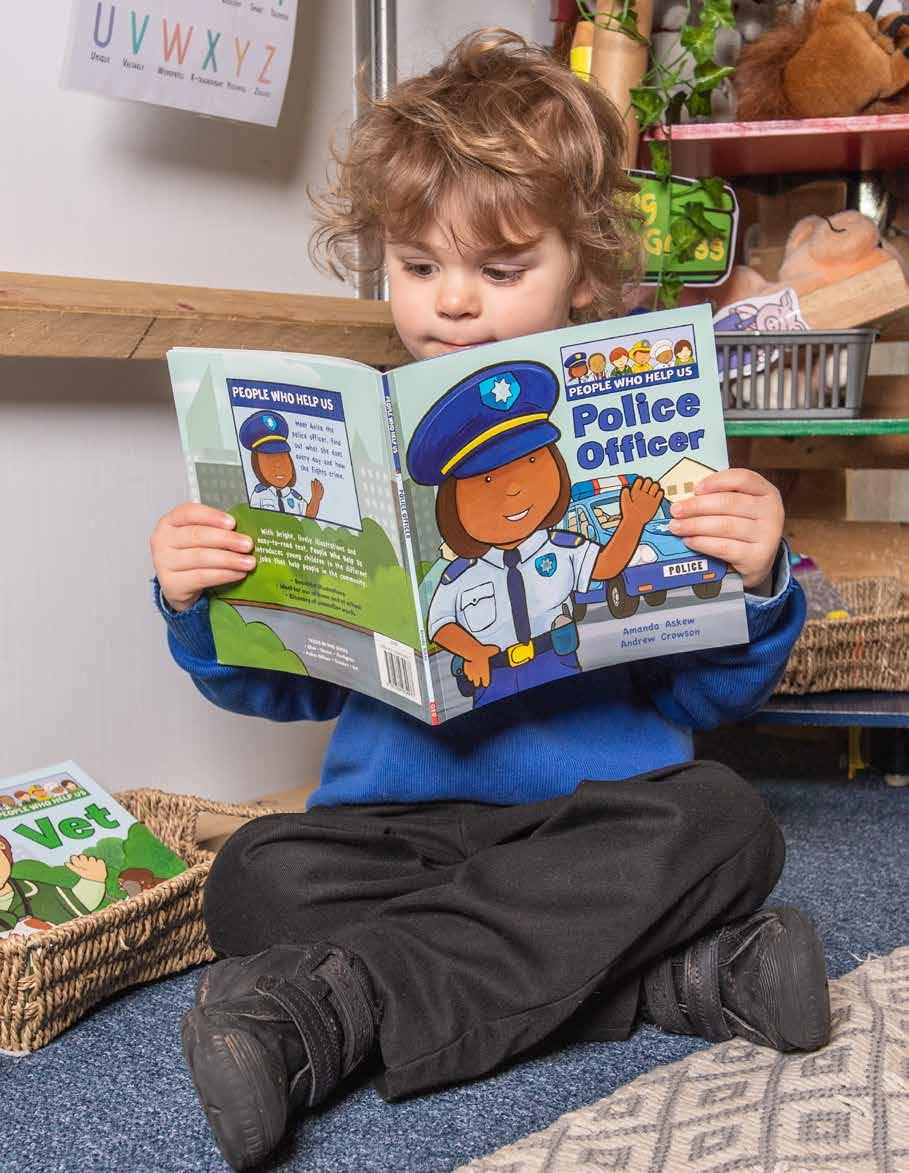
“ONCE you’ve done the training, it really opens your eyes. You see inequalities everywhere, and you can’t unsee them.”
NEU member Hayley Lockett is a year 4 teacher at Packmoor Ormiston Academy, in Stoke-on-Trent, which is four months into a programme to tackle gender stereotypes in the school environment.
Created by non-profit organisation Lifting Limits, the programme asks staff to look at everything they do through a gender equality lens – considering how resources, the school environment and language might reinforce harmful stereotypes. A champion is appointed at each school – in Packmoor’s case, this is Hayley – who attends a training session by Lifting Limits and then goes back into school to roll out the programme.
Hayley began by asking curriculum leaders to look at their subject – the planning, delivery and content – to see whether gender stereotypes were being reinforced by going unnoticed or not being challenged.
“It empowered them to find areas where we can improve. It’s not only had a positive impact on the children, but on the staff, environment and curriculum, too.”
They discovered that the science, art and history curricula focused predominantly on the achievements of men, sending powerful messages to children about what they might aspire to, or not.
A history timeline, which ran the length of the school corridor, was also heavily male, says Hayley. “Before Lifting Limits, I don’t think we’d have noticed.”
The timeline has been updated with photos and information provided in the Lifting Limits resource pack, highlighting the contributions of women who have previously been neglected.
Invaluable resources about inspirational women
Staff at Fleet Primary School in Camden went through the Lifting Limits programme in 2022. Becca Wall, deputy head teacher, says the resource pack was invaluable. It includes ideas of inspirational women to study, discussion cards, posters, language and playground guides for staff, and lesson plan ideas for years 1 to 6, which tie into the curriculum.
“We found them really easy to incorporate into purposeful learning,” says Becca.
In one lesson children are asked to draw and describe their own non-stereotypical superhero. Among the creations from Fleet Primary students is Alex, who has laser eyes, moves things by magic, is gender
fluid and has one arm; and Onyx, a boy whose superpowers are being caring, gentle and kind.
In another lesson, children listen to the story of The Paper Bag Princess, which turns the traditional ‘damsel in distress’ narrative on its head, with the princess rescuing a kidnapped prince. Children discuss what it means to be a princess, exploring the expectations associated with that role.
Never too early to tackle entrenched views
Kirsty Ruthven is an NEU member and head of education at Lifting Limits. She says that expectations are placed on children even before they are born based on their gender or perceived gender – colour coding (pink for a girl and blue for a boy) and segregation of toys and clothes in shops – and it is vital that work begins in the early years to tackle this.
“Anything you do at high school is amazing, but actually you’re unpicking a lot of entrenched views already.”
At Packmoor, nursery staff found these gendered expectations were already hindering boys when they spent several days observing children and discovered boys were not using the reading area. Principal Sharon May says she was shocked to discover the reason.
“It was nicely set up, with lots of bright, colourful books and eventually the nursery teacher asked boys why they weren’t using it. They said: ‘It’s got a pink chair and girls sit on pink chairs.’”
The area has since been changed – along with a number of other learning areas in the school – and has a more neutral colour. “Boys are now accessing the reading area,” says Sharon. “But that could’ve been a year of children choosing not to go in that area.”
Year 2 pupils: ‘Boys are clever, girls are pretty’ Sharon is hoping that the programme will have a positive effect on the children’s career aspirations, which is something they are focusing on this year at Packmoor.
“Stoke-on-Trent is quite a deprived area and low aspiration is a big issue. While we get good results generally, a lot of our children want to be footballers and influencers and there’s been a legacy of children not going on to further education.”
The worry, she says, is that gender stereotypes limit what children think they can be. At the beginning of the programme, a year 2 class, asked whether there were differences between boys and girls, said boys were clever while girls were pretty. continued on page 26
clever boys
girls
educate Your magazine from the National Education Union (NEU) 25
Photos by Matt Wilkinson
pretty
Sarah Thompson explores how charity Lifting Limits is helping to break down gender stereotypes in schools.
Feature
continued from page 25
“Honestly, it shocked me,” says Sharon. The school is creating opportunities for children to see people working in nongender-typical roles. Male nurses have visited to talk about their job and children have been taken to see the Lionesses, the England women’s national football team, play at Old Trafford.
“Our job is to open their eyes and show there are different options,” says Sharon.
Boys and mental health
While gender inequality has often focused on the experience of girls, the impact of gender stereotypes on boys is no less harmful. Lifting Limits allows space for pupils to discuss some of the things they hear.
“They are surrounded by messages like ‘man up’ and ‘boys don’t cry’. We were able to collectively unpack how that was related to gender and how unfair it was,” says Becca, adding that the “frightening” statistics around men’s mental health, suicide and prison rates illustrate the need to reconsider our expectations of young boys.
While a key focus of Lifting Limits is challenging and changing the maledominated curriculum in schools, Kirsty says that the programme aims to raise awareness among all children that they can take on any role, regardless of their gender.
“If people have very strong views around gender stereotypes, research shows it has a poor effect on mental health,” Kirsty says.
“If you’re thinking ‘I’ve got to be this kind of man or kind of women’, as soon as you deviate from that idea, you think ‘there’s something wrong with me, I’m not good enough.’”
Children are leading the way Hayley says children at Packmoor have developed the confidence to question and challenge stereotypes and bias and are leading the way to change.


In a year 4 class recently when one child stated “girls can’t play football” the others immediately questioned this. “They challenge
each other, asking ‘why do you think that?’ It is having a positive impact,” says Hayley. Next month, a group of children will meet with the parent, teacher and friends association to request funding for new reading books. The list – compiled by the children – includes Gerald Wants to Wear Pink, A Different Sort of Normal, Marcus Rashford’s
Books that challenge gender stereotypes


n The Paper Bag Princess Robert Munsch
n A Different Sort of Normal Abigail Balfe
n The Breakfast Club Adventures Marcus Rashford

n Gerald Wants to Wear Pink Becci Murray
n Emmeline and the Plucky Pup Megan Rix
n My Shadow is Pink Scott Stuart
n Mae Among the Stars Roda Ahmed

26 educate Your magazine from the National Education Union (NEU)
The Breakfast Club Adventures and ’Twas the Night Before Pride. The books not only subvert ‘traditional’ gender stereotypes, but also those around disability, race and sexuality.
At Barnham CEVC Primary in Suffolk, teacher Tara Cross says class discussions around gender stereotypes have also led to children considering other barriers to equality.

In a year 4 lesson about scientist Katherine Johnson, Tara says a girl pointed out: “She didn’t get the recognition she deserved for her work towards the space mission. This was because she was Black and a woman. If she was a white man, she would have got credit for her work.”
The school is also teaching children about the use of pronouns and the fact that not everyone identifies as the gender registered at their birth. One year 3 child has a parent who is transgender. “For Father’s Day they wanted to draw a dress on their card, and they put the transgender flag inside it. It has been easily accepted by all of their peers.”
Lifting Limits is keen to break the habit in some schools of labelling children by gender and highlight the things children have in common with one another instead.
“Having school structures and routines that highlight gender is saying, girls and boys are different,” says Kirsty, adding that this can encourage unhealthy relationships between children.
One school had a behaviour system in place which involved teachers adding tokens to jars when children displayed good behaviour and giving them a reward when the jar was full. But they had a jar for girls and a jar for boys. “It was creating this really quite toxic competition,” says Kirsty. “You’re pitting a ‘boys versus girls’ narrative. There’s nothing wrong with competition, but what are the defining characteristics you’re using?
“We say to schools, ‘why have you got your water bottles in a girl box and a boy box? Would you have a free school meals box and a non-free school meals box?’ People are aghast
n Resources for primary schools: neu.org.uk/breaking-mould

n Lifting Limits: liftinglimits.org.uk
at that, but why use gender as a defining characteristic when there are other defining characteristics you wouldn’t dream of using?”
Tara says: “We have changed our uniform policy from separate girls’ and boys’ uniforms to just saying school uniform.”
Doing things differently
While schools have been working hard to open children’s eyes to gender stereotyping, staff too have found they are rethinking some of their own behaviours and use of language.
“I remember having a conversation in a class about the phrase ‘man up’, and how I would find that offensive,” says Becca. “A colleague in the room was surprised about that. I think some staff hadn’t previously given much thought to some sayings.”
At Packmoor, Hayley says in the past, when letters were sent home, she would say to children, “give that to your mum”, assuming they were the main carer. She is no longer doing this, and was shocked when she realised the messaging it was reinforcing.
“It’s not about beating yourself up about it,” Hayley says. “It’s thinking, I can do things differently.”
educate Your magazine from the National Education Union (NEU) 27
“It’s not about beating yourself up. It’s thinking, I can do things differently.”
Hayley Lockett (above)
Feature
Find out more…
Packmoor Ormiston Academy, Stoke-on-Trent
@ArtsmarkAward /Artsmark1






Put creativity at the heart of your curriculum with Artsmark


Ensure every young person can be creative and access a diverse and inclusive high-quality cultural education.
Artsmark Award's flexible framework supports you to embed arts, culture and creativity across your whole setting. Scan me to find out more.


educate Your magazine from the National Education Union (NEU) 28
on
IN October, an evaluation of England’s flagship phonics programme Ruth Miskin’s Read Write Inc was published by the Education Endowment Fund (EEF), a charity dedicated to breaking the link between family income and educational achievement.

The six-year study, costing £1 million, had difficulties making statistically significant conclusions about the programme’s effectiveness. Nevertheless, it did produce some troubling findings.
Pupils taught the programme only made one month of extra progress compared to those not using Read Write Inc. Even more concerning was that children in an additional intervention group made less progress than those not having further support.
A second evaluation by the EEF looking to give a clearer picture of the programme’s effectiveness has not yet been published. The EEF’s first report has contributed to the growing feeling that the dominance of systematic synthetic phonics (SSP) in our early years and primary settings is unjustified.
Graphemes, phonemes and blending SSP sees children ‘segment’ words into graphemes (letters and groups of letters), which then correspond to a phoneme (a sound). These are then ‘blended’ together when children read. Schools typically use programmes, such as Jolly Phonics and Read Write Inc, to teach SSP. These programmes provide schemes of learning and lesson plans, as well as books and resources matched to the phonetic ability
of children. These lessons are taught separately from other literacy activities, sometimes in ability groups.
Research commissioned by the NEU in 2017 found that ability grouping starts early –sometimes even in nursery. Teaching reading in this way makes big demands on limited school resources, including the staffing for groups and funding for programmes. The EEF’s report highlights that Read Write Inc, for example, costs £18,960 for one school over three years.
Given this investment, it comes as no surprise that phonics forms a large part of early reading. In research published earlier last year (bit.ly/3WgGuzn), UCL professors Dominic Wyse and Alice Bradbury found that most teachers they surveyed felt teaching of SSP came “first and foremost” in their teaching of reading.
Phonics the ‘building blocks’ for reading Jon Biddle, English co-ordinator at Moorlands Primary Academy and a National Council member of the United Kingdom Literacy Association (UKLA), believes the prevalence of phonics is misguided.
“Phonics does have an important role to play in learning to read. A child who can decode letters and sounds accurately and fluently has the building blocks in place to become a proficient reader,” he says.
“However, the message about the purpose of reading can often get lost or misunderstood. Reading without comprehension isn’t really reading. Reading without thinking about the text or making predictions isn’t really reading.”
continued on page 31
isn’t the only answer’
educate Your magazine from the National Education Union (NEU) 29
‘Phonics
The focus
phonics is misguided, educators tell NEU early years and primary education policy officer Molly Hall.
“Children can pick up language acquisition and reading skills through play.”
Merike Williams (above)
Feature
For more information on education rates, workshops and resources visit disneyticketsgroups.co.uk





























































 Winnie The Pooh
Winnie The Pooh
continued from page 29
In the classroom, the focus on phonics can sideline alternative approaches and demotivate children who find SSP difficult.
Merike Williams, a year 1 and 2 teacher from Stockton-on-Tees, County Durham, says: “I think we have too much of an emphasis on phonics – it isn’t the only answer to teaching reading. It works well for the typical child, but what about children for whom it clearly isn’t working?
“I know that there are other ways of teaching reading. Learning through play –with carefully planned resources – has been incredibly successful for me. I have seen children can pick up language acquisition and reading skills through their play.”
‘Less time to read, write and listen’ Many educators share Merike’s experience. According to a group of year 1 teachers from Camden: “Over-focusing on phonics takes away from other important elements of children becoming confident, engaged readers, such as having space to explore and develop their own responses and connections with stories, poems and information. There is less time to read to children, hear them tell their own stories and listen to them recite rhymes and poems – all strategies which greatly benefit reading.”
The teachers’ concerns are echoed in research. UCL’s Wyse and Bradbury found substantial evidence for “balanced instruction”, which teaches word, sentence and whole-text skills alongside phonics. England’s phonics-centred approach is not supported by a robust evidence base. Rebalancing it will take significant, systematic change from Government. Accountability measures have ensured schools prioritise SSP. Ofsted insists on it, recommending that “the teaching of reading, including systematic synthetic phonics, is the core purpose of the reception year”. Phonics-focused ‘deep dives’ of early reading are mandatory within inspections.
Nonsensical decodable words
On top of these demands, there is the phonics screening check for year 1 children, in which they read 40 decodable words, including nonsense words such as ‘jif’ or ‘ret’. Children learn these non-words to prepare for the test – meaningless words they will never use in their reading or writing again. No element of the test assesses their comprehension of the words they are reading.
The group of year 1 teachers from Camden, like many others, believe the check
has been counterproductive to the teaching of reading: “Like other high-stakes testing in primary schools, the phonics check dictates what is taught in an unhelpful way and is more a measure of whether children have been prepared for a test rather than anything else. Spending time teaching children how to read nonsense words is not time usefully spent and does not meaningfully give them the opportunity to develop as readers. It is a barrier to effective teaching of reading.”
The check is just one part of Government’s flawed approach to reading. Too much money and time is invested in an approach not supported by evidence. Policy should be based on a principle that many teachers already understand: phonics is an important puzzle piece of teaching children to read, but it should not be the complete picture.
The teaching of reading needs to be rebalanced, so teachers have the time and resources to support children’s comprehension and love of reading, as well as their ability to decode.
n What do you think about phonics? Email your views to educate@neu.org.uk
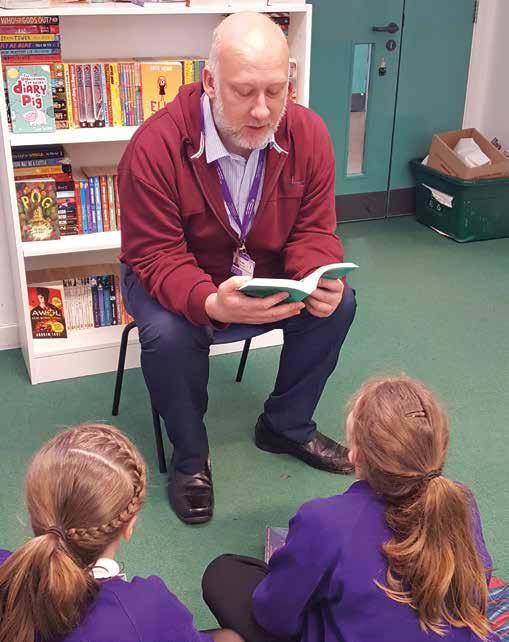
educate Your magazine from the National Education Union (NEU) 31
Feature
“Reading without comprehension isn’t really reading.”
Jon Biddle (above)
“Spending time teaching children how to read nonsense words does not meaningfully give them the opportunity to develop as readers.”
Join the fun at MAMMA MIA!, the world’s sunniest, most exhilarating smash-hit musical! Since premiering in London’s West End over 23 years ago, ‘the ultimate feel-good show’ (Classic FM) has thrilled over 65 million people around the world.




Fall in love with the irresistibly funny tale of a mother, a daughter and three possible dads on a Greek island idyll, all unfolding to the magic of ABBA’s timeless songs. Whatever age you are, you can’t help but have the time of your life at MAMMA MIA!


EDUCATION GROUPS 10+ FROM £17.50 One teacher goes free with every 10 tickets £17.50 GRAND CIRCLE | £25 STALLS AND DRESS CIRCLE Valid Monday - Thursday evenings and Thursday matinees. Subject to availability and exclusions Call DELFONT MACKINTOSH EDUCATION 0344 482 5100* Email education@delfontmackintosh.co.uk *Calls to Delfont Mackintosh Theatre 03 numbers cost no more than a national rate to an 01 or 02 number mamma-mia.com NOVELLO THEATRE A DELFONT MACKINTOSH THEATRE ©LITTLESTAR Scan the QR code to download the MAMMA MIA! study guide
Maths
Words by Michael Rosen
 Illustration by Dan Berry
Illustration by Dan Berry
I was sitting one morning, radio on, drinking tea When I heard a voice, calling on me to agree (well, not just me, it was directed at the nation) that it was time to shake up post-16 education.
That’s funny, I thought, haven’t there been bills and acts which a secretary of state approves and enacts? But here was Mr Sunak telling us what he’d thought up. I nearly coughed up my tea back into my cup!
Maths! More maths! The Prime Minister demanded. I wondered if this is what he had commanded. Is education now run to a brand-new plan: what gets taught is the whim of just one man?
What if post-16s would prefer other subjects? And could it just be a person of that age objects?
And there’s one other matter causing a laugh: how’s Rishi going to get all his new maths staff?
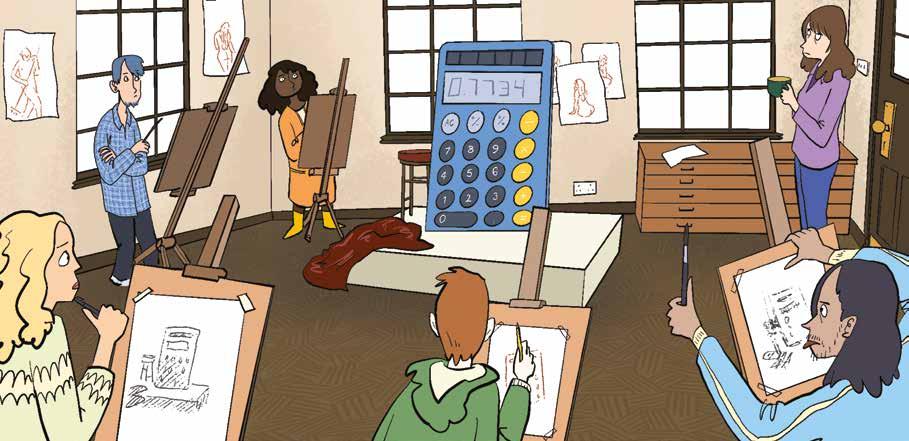
educate Your magazine from the National Education Union (NEU) 33
Michael Rosen
















educate Your magazine from the National Education Union (NEU) 34 HOLIDAYS ABROAD WE NEED YOU! LIVE IN OR AROUND NORTH LONDON? Quali ed teachers needed to teach motivated pupils on weekday evenings and/or Saturdays Please email CV to: info@afterschoollearning.com 020 8440 8586 www.afterschoollearning.com Established 2007 WE OFFER GREAT RATES Primary Years 1 - 6 Secondary Maths Secondary Science Secondary English RECRUITMENT HOLIDAYS UK HOMECARE S.FRANCE-AVEYRON (12) Rural, hillside cottage. Sleeps 6. Terrace, Balcony, Garden. Beautiful views, very peaceful. 5kms from the Château de Bournazel. Great base for exploring Aveyron/Lot/ Cantal. Walking, bird watching, amazing night skies. £450pw JuneSeptember. northardr@gmail.com Want to promote a service or product to over 430,000 educators? To discuss your requirements contact: Tel: +44 (0) 20 7324 2754 Email: educate-class@redactive.co.uk 01580 715870 | | ww f e e STOPS DOWNDRAFT CREATES DRAW FOR BURNING EFFICIENCY GUARANTEED TO WORK Just to let you know I installed the FlueCube you supplied me with today and it made a virtually unusable stove in to a great working one. One happy customer. Paul Bullivant, Clean and Clear Chimneys, Spalding Great product, we tried everything but this is the only cowl that solved our down draught problems Pat Co Down N Ireland WHAT THE CUSTOMERS SAY... MADE IN BRITIAN Used by Fantastic Sea View Flat near Brighton Our one bedroom at has direct sea views onto the beach at Rottingdean and backs onto the Sussex Downs. If you are a teacher and want to arrange a visit please contact valerieharry@aol.com Reasonable rates.
Evidence-based facts? A minor inconvenience
IS Ofsted meaningfully accountable to anyone other than this Government?


The question occurs after Amanda Spielman, the chief inspector, gave a lengthy talk in the academic setting of Oxford University’s department of education on the inspectorate’s use of research.
Contacts who had followed Ofsted’s controversial “research reviews” in national curriculum subjects, which I wrote about in my last column, tipped me off in advance about this talk. There was a sense of incredulity that the watchdog, which had faced widespread criticism within education about the reviews, could be lecturing anyone on this subject.
As I wrote last time, Ofsted’s research review on maths had based a statement about pupils enjoying tests on a study involving only
five pupils. That document had founded a statement on homework motivating children on a study which had not investigated the issue. A well-known maths academic had accused Ofsted of “complete fabrication” in relation to his own research. In English, another leading figure in her field had said it was “hard to see” how Ofsted’s document “bears any resemblance” to an editorial of hers which it had referenced.
Yet none of this was acknowledged in Ms Spielman’s talk – even though she highlighted the fact that the research reviews had been downloaded “many hundreds of thousands times” by schools. If there really were problems with Ofsted’s evidence base, should she not at least acknowledge the critique, given the experience and knowledge of some of those making it, and the influence of these reviews?
Ms Spielman only acknowledged that “educational research is contestable and contested”, without conceding that few would disagree, for example, that a study involving five participants should not be a solid basis for generalisation.
Ofsted’s use of research in several of these documents is widely seen by critics as in support of traditionalist
approaches to education which align with those of this Government.
The talk came a couple of months after Ms Spielman had appeared before the Commons Education Committee as part of its own accountability hearings. She was asked about a comment by NEU joint general secretary Kevin Courtney that there needed to be a “root and branch review of the way that schools are inspected”.
In response, Ms Spielman seemed dismissive. “The NEU has been campaigning for our abolition for many years,” she said, without getting into any detail about its members’ concerns. Formally, His Majesty’s Chief Inspector is accountable to this committee, although their appointment is by the Secretary of State for Education.
Ms Spielman often comes across as thoughtful and reasonable. However, appearances such as this seem to underscore a sense that Ofsted is not meaningfully responsive to critique, in public at least. Is it only really answerable behind closed doors to ministers?
If so, perhaps it will require a general election to sweep in change, and for the inspectorate to acknowledge that the arguments of its critics might actually carry some weight.
educate Your magazine from the National Education Union (NEU) 35
Warwick Mansell is a freelance education journalist and founder/writer of educationuncovered.
Opinion
Cartoon by Tim Sanders
Ask the union
Lower TLR for temporary cover
I’VE been promoted to head of department for a year to cover maternity leave. The position is usually paid at TLR2, but I’m being paid at a TLR3. The school says it is because the post is temporary, but this feels unfair.
You are right. In a situation such as this, where a teacher is temporarily occupying a different post in the staffing structure to which a teaching and learning responsibility (TLR) payment is attached, the TLR concerned – in this case, TLR2 – should be awarded on a temporary basis and for the duration of the responsibility concerned.
The statutory guidance in section 3 of the school teachers’ pay and conditions document includes as examples teachers who are covering for maternity or sick leave, a vacancy or a secondment. n Visit bit.ly/3X1;8qJj
Redundancy if I don’t get job?
I’M a teacher on a fixed-term contract. The school has decided to make my position permanent. I hoped the school would give the job to me, but it has decided to advertise. If I’m unsuccessful, am I entitled to redundancy?
If you have worked for the same employer for two years or longer, it can only end your employment for a reason that is fair in law.
One such reason could be redundancy. However, if there is an ongoing need for the role this would not be a redundancy situation and the school would be unlikely to be able to rely on that as a fair reason for dismissal. Have you asked why your employer is advertising the role?
Colleague’s inappropriate behaviour towards student teacher
I’M a student teacher on a six-week placement. I’m concerned about one of the teachers in the department. He often uses sexist language and gets too close to me. I don’t want to jeopardise my course, so I’m unsure what to do.
You are right to raise this issue. Your colleague’s behaviour is inappropriate and unprofessional. Sexual harassment and sex-based harassment is unlawful.
You have a right to a safe placement; your course provider and the school should take steps to protect you from harassment and any further repercussions.
If you can, discuss your concerns with your NEU rep. If not, contact the union’s AdviceLine (0345 811 8111). You could deal with the matter informally – you or your rep could write to the colleague asking him to stop using sexist language and to respect your personal space. You could make a complaint to your training provider – they should take steps to ensure that you and other student teachers are not being subjected to unlawful conduct by school staff.
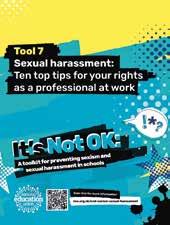
A formal grievance might be necessary if an informal approach is not appropriate or effective. If your colleagues have raised similar concerns about this colleague, you may be advised to lodge a collective grievance jointly. The process might not conclude before the end of your sixweek placement but working together might prove to be more effective in empowering colleagues, raising morale and avoiding further harassment.
The objective will be to stop the unwanted behaviour and allow you to continue your training in a professional environment free from harassment.
n Visit neu.org.uk/end-sexism-sexual-harassment
If you went through a competitive interview process in the first place, then your school is not required to re-advertise the post in order to offer it to you on a permanent basis. Equally, if others have been kept on after fixed-term contracts and you have not, it would be worth exploring why this is the case. Check your contract of employment/staff handbook to ensure your employer is adhering
Free CPD webinars for all NEU members
NEU members have exclusive access to our continuing professional development (CPD) webinars. Here are some of the courses coming up.
Disruption in the classroom: managing challenging situations
This session for early career teachers and trainees looks at how to deal with more challenging classroom behaviour, giving you the confidence to employ de-escalation techniques, use your voice and body language to influence behaviour and keep thorough and appropriate records.
7 March from 11am-12.30pm
Effective teaching and learning strategies
Low-effort, high-impact ideas for any classroom, including dual coding, abstract/concrete representations, questioning, modelling and retrieval.
8 March from 4-5.15pm
Securing your first job
Applying for roles, interview technique and considerations when starting a new role.
9 March from 3.45-5pm
Developing middle leaders (level 2) This programme for experienced middle leaders, run in partnership with UCL’s
to the contract and its own policies.
If you have less than two years’ employment then your recourse may be limited to your contractual rights. Speak to your workplace rep or contact the NEU adviceline to consider your options.
Please email your questions to educate@neu.org.uk
Centre for Educational Leadership, will look at the psychology of leadership, and blend up-to-date research with practical activities to develop your confidence and leadership skills.
14 March-18 July
SEND webinar week
A series of webinars focusing on SEND theory and practical classroom ideas.
21-24 March
n Webinars are available for seven days.
n Email cpd@neu.org.uk or visit neu.org.uk/national-cpd
36 educate Your magazine from the National Education Union (NEU)
Music and song winning over hearts and minds A class act
Geography teacher turned eco-educator Paul Turner (pictured) inspires children to become critical of the world. Sally Gillen finds out what makes him a class act.

STARTING a lesson with a song may be typical in a music or drama lesson, but in geography? Unusual, yes, but Paul Turner believes that with its power to stir emotion, song can provide the ideal introduction to topics such as equality, colonialism and migration.
All are covered in a series of eight lessons he has developed for key stage 3 pupils on the theme of land ownership. Launched online in January, each of the lessons begins with a folk song, and then pupils spend two minutes discussing with a classmate how the song made them feel.
‘Invoking a more human response’ Paul’s aim is to design lessons that target pupils’ hearts, not just their minds.
“Songs appeal to students’ emotions and help invoke a more human response,” he explains. “A lot of teachers have fallen into rote learning, just imparting knowledge, and
what I’m trying to do is a counter to that. The lessons I’m developing are designed to generate debate among students and turn them into critical and questioning citizens.
“What drives me as a teacher is wanting to create lessons that are critical of the world, and which are designed to make a better world. It’s not about pupils passively learning some facts, but about opening their eyes to the world around them.”
Inspired by Three Acres and a Cow, a touring show that explores the history of land rights in England through folk song, story and poem, Paul’s eight lessons include debates on some of today’s problems, including the reasons for the housing crisis.
One lesson, Should we be free to roam? encourages pupils to reflect on the fact that, as citizens, they are only allowed to explore eight per cent of the land and three per cent of rivers in England.
It begins with folk singer Ewan MacColl’s Manchester Rambler, with its chorus: “I’m a rambler, I’m a rambler from Manchester way. I get all me pleasure the hard moorland way. I may be a wage slave on Monday. But I am a free man on Sunday.”
Workers’ rights, focusing on trade unions, their role and what they have achieved, are also covered in the scheme of learning, within a lesson that kicks off with Billy Bragg’s song There is Power in a Union.
A songbook including tunes by the likes of Billy Bragg and Commoners Choir has been compiled to accompany the lessons.
Experts and educators in partnership Paul is active in the NEU’s climate change network and was a geography teacher for 15 years before deciding to step away from the classroom two years ago to take up a role as an education lead at environmental charity, Ministry of Eco Education. He wanted to have an impact beyond one school, he says. However, his new role regularly takes him into schools, and, separately, he still finds time to devise lesson plans to share with other educators. He began publishing resources online when he was still teaching, and his lessons on climate change, for example, have proved very popular and been downloaded more than 10,000 times.
“All of the lessons I devised as a teacher, I have always shared on my website,” he says. “It has always felt like a way to increase the value of things I create.”
His approach is to work with experts, who are authors in their field, to design the lessons. The climate change resources, for example, were developed after Paul read How bad are bananas? by renowned scientist Mike Berners-Lee.
Similarly, he devised lessons on land ownership based on a book by Guy Shrubsole, Who Owns England? Paul reads a book and then works with the author to make its content into lessons.
“A lot of authors would love to be more involved in education, and they have materials to support schools using their books and ideas, but don’t know how to go about it,” he says.
“The partnership works because the author is the subject expert, but the thing they are missing is the ability to translate that for a youth audience and teach it. In geography, in particular, teachers are reading books and thinking about how they can bring them to the classroom.
“As teachers, we understand how to translate these ideas into learning activities to make the lessons interesting for young people.”
n Visit ministryofeco.org
educate Your magazine from the National Education Union (NEU) 37
n Visit bit.ly/threeacresandacow
Do you know a class act? Email educate@ neu.org.uk












educate Your magazine from the National Education Union (NEU) 38 TELL THE STORIES THAT NEED TO BE HEARD Book your school visit to Imperial War Museums now iwm.org.uk/learning Get noticed with your advert here For more information, contact: Tel: +44 (0) 20 7880 7614 Email: educate-magazine@redactive.co.uk Your magazine from the National Education Union Welfare at work Happy teachers make good teachers. See page 22. Cost-of-living crisis Scandal of in-work poverty in education sector. See page 25. Pay ballot NEU to ballot members for a decent pay rise. See page 7. September/ October 2022 Walkin’ on sunshine Tolpuddle marchers’ joyful celebration of solidarity Your magazine from the National Education Union September/ October 2022
Outgoing NEU international solidarity committee chair Gawain
Standing up for children and educators worldwide
THE global Covid-19 pandemic has shown how interconnected our world is. What happens in one country has repercussions across the globe.
This is something the NEU and its membership have long been aware of. From international evenings hosted by NEU school groups to solidarity delegations visiting the other side of the world, our members are engaged in making a difference, at home and abroad.
A clear strategy
Every international project the union takes on is assessed against its contribution to delivering the following four key aims:
n Promoting human, trade union and children’s rights across the world. Whether it is campaigning for the release of jailed union leaders, or supporting women’s rights in Iran, or for the rights of girls in Afghanistan to access education, we have a crucial role to play.
n Campaigning for every child to have access to free, quality public education. This includes work from supporting campaigns such as Send My Friend to School, to opposing the aggressive growth of UK-funded, low-cost, for-profit private education in countries such as Kenya, Uganda and India.
n Increasing engagement and activity among our own members, whether that is through building a campaign in their local area, participating in a solidarity delegation or becoming part of a national or international solidarity campaign.
n Focusing on what we can learn from other unions internationally and how we can link our campaigns together – for example, strengthening our struggle against academisation through co-ordinating with the fight against charter schools in the US.
Making a real difference
This work makes a difference on a number of fronts. For example, for Cuban teachers who live under the restrictions of an illegal US blockade of their country, which deprives their classrooms of vital resources. Each year the NEU organises a solidarity delegation to Cuba to take classroom resources and to learn and speak about the Cuban education system.
Niurka María González Orberá, the elected general secretary of the Cuban education union SNTECD (pictured above), recently wrote to us, saying: “On behalf of our workers and those affiliated to us we want to thank the NEU for its presence and the help our country has received from the solidarity campaign in breaking the wall of silence.”
It also makes a real difference to our members. Daisy, a member in London, says: “Involvement in international solidarity work galvanised me to become more active in the NEU and apply to become an international solidarity officer for my district. I have been inspired not just to fight for change in this country but to promote solidarity with our colleagues around the world.”
Lucy, an Oxfordshire member, says: “International solidarity work made me really
understand the importance of union activism. I’ve presented at local meetings, spoken at the Latin America conference in London and had two articles published – things I previously never would have considered doing.”

Lucy went on to become vice-president, and then joint secretary, for her district.
There are multiple opportunities to get involved in our solidarity work – for example, by supporting the Viva la Educación campaign that the union is running jointly with the Cuba Solidarity Campaign. This aims to raise £100,000 for two shipping containers of educational materials for Cuba, to be sent off following our annual conference this year. To find out more about how you can help raise funds, visit vivaeducacion.org.uk
Solidarity without borders
Solidarity is a two-way process – our international work supports students, educators and trade unionists across the world, but it also strengthens our own union.
The principle of solidarity on which our movement is founded should know no borders. The NEU can be proud of its work standing up for education, children and educators in every corner of the globe.
n Read On the Global Stage, which documents the international work of the union in 2022, at neu.org.uk/media/24121/view
n Get more involved or find out about becoming an international solidarity officer for your district at neu.org.uk/international or email international@neu.org.uk
International
educate Your magazine from the National Education Union (NEU) 39
Little explains why international solidarity is at the heart of the union’s vision.
Niurka María González Orberá, the elected general secretary of the Cuban education union SNTECD, speaking at the NEU’s annual conference in April 2022.
PHOTO by Kois Miah
Jon Biddle, English lead and NEU rep at Moorlands Primary in
Giving poetry a platform
POETRY can sometimes feel like the poor relation when it comes to teaching English in primary schools.
You might overhear the year 3 team talking in the staffroom about the infamous “annual poetry unit” that’s usually squeezed into the last week of an extremely busy term. Or year 6 teachers swapping “fantastic” poetry comprehension activities to support those key marginals in the run-up to SATs. There might even be an assembly to celebrate National Poetry Day where overworked teachers are literally selecting poems to read out on their way into the hall.
However, if we want our pupils to have a genuine appreciation of poetry, of the joy it can bring, of how it teaches us to play with language, of the way it allows us to express our emotions, of how it is often a gateway into reading for pleasure, then it needs to be embedded into the school culture. It’s not easy, admittedly, with the ever-increasing pressures on the timetable, but it’s worth prioritising.
At Moorlands, almost every class now runs Poem of the Day, where children volunteer, individually, with a partner or in a small group, to choose and share a poem with the class. If staff and the more confident pupils lead the way over the first week or two, it quickly becomes self-sustaining. We’ve even had children writing poems at home to perform to their peers.
It often takes a couple of months for some children to find the courage to read out a poem, but watching the boost to their self-confidence afterwards is worth the wait. Once a week, the pupils disappear off to read their poems to different classes so it becomes a whole-school event.
Give your young poets an audience
It’s also essential for children to recognise that poetry can be created by everyone. One of the most important things to do is make sure that pupils’ poems are performed or published and not just lingering in an exercise book. Share

them with parents in assembly, get them on the school website, print them out and stick them up round the school. Give them an audience and show the children they’re being read. Each term, we distribute a few exercise books (pictured left) around the school – in the library, our reading shed, the dining hall, etc – along with a selection of colourful pens. Pupils then have the opportunity to write poetry in the books during their free time. At the end of the term, the books are all put in the library for everyone to enjoy. The fact that the children know their work is going to be read by their peers gives them a real purpose for their writing.

Enthusiasm about poems is infectious so find a couple of poetry books that you enjoy and share favourite poems with the children.
Find the ones that move you, interest you and amaze you. Is there some time in the week to squeeze in a bit of extra poetry writing? Teach them about fun poems, such as lipograms, where a certain letter has to be omitted from the writing, and N+7 poems, where the children select a favourite poem, highlight the nouns and replace them with the nearest noun that’s seven words further on in the dictionary. Get them writing poems together as a class. ‘Ten things my teacher would never say’ is always guaranteed to produce laughs. Set them the challenge of the Three Minute Poem, where the only rule is that nobody, adults included, can stop writing for three minutes. Pair them up with a collection of poetry books and a pile of sticky notes to jot down their thoughts. It may take time to demonstrate how enjoyable, powerful and inclusive poetry is, but creating a class of poetry enthusiasts is enormously rewarding. @jonnybid
Read

Reviews
(Above) Mr Biddle’s class poetry collection (Below) Pupils write their own poems in books dotted around school
Norfolk, is passionate about fostering a love of reading for pleasure. Here he shares ideas and tips for schools to try.
more ideas from Jon next issue
educate Your magazine from the National Education Union (NEU) 40
Do you have a book to review?
Send us your suggested books for children and young people with inclusivity at their heart to educate@neu.org.uk
Wellbeing in the Primary Classroom
ADRIAN Bethune’s thought-provoking book provides innovative tips and ideas for promoting wellbeing in the primary classroom.
As well as suggesting practical ideas for incorporating wellbeing into the school day – such as creating a tribal classroom (one of belonging) and allowing children quiet time to reflect using mindfulness techniques – the book also delves into the functions of the brain and the importance of teacher wellbeing.
A handy guide packed with ideas and helpful downloadable resources and useful links to websites and videos to use in school.
Cindy Shanks
Wellbeing in the Primary Classroom, by Adrian Bethune. Bloomsbury. £17.99.
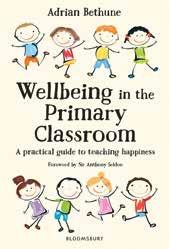
The Island That Didn’t Exist
WHAT would you do if you inherited a mysterious island? After hearing his Great Uncle Silvester has died, 12-year-old Rixon Webster is astonished to discover he’s the new owner of Splinter Island. But is it real?

Apart from an old map from 1792, showing a tiny comma-shaped island, there is no proof of the island’s existence. Rixon decides he will have to discover for himself if it really exists, and his explorations lead him into the middle of an unexpected adventure.
An exciting debut novel by Joe Wilson that immediately hooks in readers. Ideal for children aged nine and upwards.
Cindy Shanks
The Island That Didn’t Exist, by Joe Wilson. Oxford University Press. £6.99.
The Grammar Book
THIS informative book contains everything educators need to know about teaching grammar effectively in primary school.
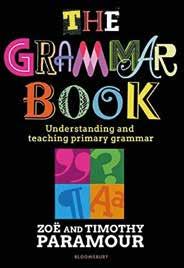
Divided into three main sections – Making Sense, Extending Sentences and Writing with Flair – this resource begins with the basics that need to be taught and shows readers how to apply them in sentences and wider writing. Brimming with ideas to use in class, there are also online printable worksheets and useful links. Particularly helpful are the FAQs, as well as the glossary that allows readers to quickly define a particular term. Written in a humorous style, The Grammar Book is a handy teacher timesaver.
Cindy Shanks
The Grammar Book, by Zoe and Timothy Paramour. Bloomsbury. £19.99.
How to be an Outstanding Primary Teaching Assistant
THIS book, written by and for teaching assistants, covers a wide range of roles and responsibilities support staff may find themselves undertaking.
Easy to follow with tried-and-tested ideas, it is designed to equip teaching assistants with a toolbox of skills and strategies. Key areas of the curriculum are covered, along with specific needs which may be experienced by pupils in the class. Everything is designed to be quick and easy to implement, allowing staff to draw on skills for whatever task they are asked to do. A must-read for staff wanting to develop their practice.
Sian Sparrow
How to be an Outstanding Primary Teaching Assistant, by Emma Davie. Bloomsbury. £16.99.
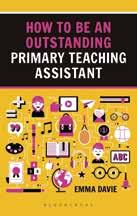
Asha & the Spirit Bird
WINNER of the Times Children’s Fiction Competition, Bilan’s magical adventure sweeps you away from the very first page. Living in the foothills of the Himalayas, Asha misses her father who works in the city. When he stops sending his wages Asha makes a pact with her friend Jeevan to find him. However, with the world’s highest mountains and snow leopards being only part of the obstacles along the way, Asha needs her faith to guide her, which comes in the form of the spirit bird of her grandmother watching over her. An unforgettable Indian adventure.
Aliss Langridge
Asha & the Spirit Bird, by Jasbinder Bilan. Chicken House books. £7.99.

educate Your magazine from the National Education Union (NEU) 41
Busting the myth of the seaside idyll

Coastal kids can thrive I FELT compelled to respond to Sally Gillen’s feature on coastal schools (Educate, January/ February, page 26 – left).
I was delighted to see Blackpool represented and agree with every point. However, I felt the issue of transient students was underplayed and that it is central to the challenge facing schools for at least the last two decades.
My daughter, now in year 11, observed that by the time of her year 6 class photo, only a
Pupils as agents of eco-change
HAVING read the very engaging article about schools’ efforts to become carbon neutral by 2030 (Educate, January/February, page 30), I noticed that a brilliant organisation called The Harmony Project (theharmonyproject.org.uk) was missing from your list.
My school developed a Harmony curriculum six years ago. It is at the core of learning, planning and community involvement and equips pupils to be agents of change rather than eco-anxiety sufferers.
It changed my teaching life by providing a coherence and a real purpose to everything the children learned, from reception year upwards.



Sian Cootes, Hampshire
third of her original reception class remained. It was a threeform entry school. As head of English in a coastal secondary, when we inputted classwork results on triplicate sheets, I was always reminded how challenging the transient issue was, when over a quarter of the year group was listed non-alphabetically at the end as they had not started formally at the start of year 7.
On top of economics, employment and aspirations, this all increases the daily challenge in
Teacher’s pet Theo
Theo is a regular visitor to The Batt C of E Primary School in Witney, Oxfordshire.

Rachel Henderson, science lead and upper school phase leader, sent Educate this beautiful photo.
She says: “Theo is our class cat. He comes in every morning to have his food and lie on the radiator - if it’s not warm enough, he soon lets us know!
“The French label next to him is a permanent fixture. He has his own house-point card.
“The children adore him; he is calming for those with worries or anxiety who can stroke and talk to him.”
Email a high-resolution photo of your treasured pet with 50 words about what makes them so special to educate@neu.org.uk
Letters
42 educate Your magazine from the National Education Union (NEU)
Your magazine from the National Education Union (NEU) Your magazine from the National Education Union (NEU) Words by Sally Gillen Portrait by Matt Wilkinson Interview
Feature Sally Gillen explores the often overlooked poverty suffered by coastal areas and the impact on their schools. WHEN Eugene Doherty was 11, his Dad made him a porter-style buggy. On Saturday mornings, Eugene would wheel it down to the bus station in Morecambe, where he would meet holidaymakers off the bus and offer to carry their luggage to the hotel. It was good way to earn some pocket money. Two years ago – and 50 years later Eugene found himself back in his home town, once again making deliveries. Only this time he was dropping off food parcels to the hotels, now converted into flats, as a volunteer for the local food bank. This reflection on the Lancashire resort’s changing fortunes, which mirrors that of many others around the country, was shared by Eugene at this year’s NEU annual conference during a debate about the challenges experienced by schools and educators in coastal areas. “I taught in London for around 20 years, in some of the poorest areas, including Tower Hamlets and Hackney, but know that the idea that all the poor areas are in inner cities is not true,” he tells Educate. Many overlooked factors influence educational attainment Eugene returned to Lancashire after taking early retirement and worked for a time as supply teacher at schools across the county. “A school in Blackpool on the south shore was the most challenging I’ve ever worked in,” he says. Interestingly, however, the unique difficulties faced by schools on the coast do not get the attention they deserve. Instead, they are likely to be named and shamed for the achievements of their pupils. In 2019, for example, the Department for Education (DfE) released report apparently showing pupils in coastal towns achieved three grades lower in their GCSEs. The complex context in which these schools exist is not taken into account. Poor transport links, lack of investment and development, low-wage jobs, seasonal work, high levels of unemployment and geographical isolation all contribute to the high levels of poverty in many of these towns. Feature Idyllic seaside life far from reality for many children In Blackpool, arguably England’s most famous seaside resort, teachers such as Christine Butterworth work with children who are among the poorest in the country. DfE data for 2020/21 showed 73 per cent of children were eligible for free school meals (FSM). At Christine’s school, around 40 per cent of children have FSM and Pupil Premium funding (at her previous school also in Blackpool it was 57 per cent) and all children are given breakfast and carton of milk. She feels there are many positives to working and living in Blackpool and proud to be teacher in the town. But has its problems. Poverty is growing, she says. Many families do not own car or catch buses, choosing to walk everywhere, meaning there are more and more children who do not travel beyond their local community. Idyllic notions of children growing up by the seaside, spending hours playing on the beach and breathing in clean air, are some distance from the reality for the poorest children. Many rarely go to the beach. “Blackpool can become quite insular and there are some families who have never moved away. This has knock-on effect because it means the children do not get to experience what the north west and beyond can offer,” she says. On school trips she hears children marvel at what are ordinary things, but which they have never seen before. One child excitedly named a brown cow “a new animal” because they had only seen ones that were black and white. “A lot of the children go on a tram for the first time, feel the sand between their toes, or get overexcited about getting on coach and going on the motorway,” she says. “These are things we take for granted but lot of our seaside children haven’t experienced activities on their own doorstep, let alone further afield.” Blackpool is town that attracts those looking for seasonal work and low-cost housing. That creates challenges for teachers, explains Christine, because families are continually moving in and out. “It becomes a transient area. In the classroom this means more children joining your class, setting up friendship groups, assigning a buddy, moving the seating around, and finding out where they are in terms of learning and understanding.” continued on page 29 “Kids are cold. Kids are hungry. Kids are angry.” Lynne Naylor (left), Holderness “Living and learning in Harmony ” Wellbei g Diversity Oneness Adaptation Ge metry Interdependenc Circles and Cycles H A R M O N Y Healthy happy l arne s All differ nt but all the sam Realising that we are one Mi rori g nature perfect designs Order and patter in and round us Ne ding one another Y sterday today and forevver r
South Farnborough Infant School
Please write The editor welcomes your letters but reserves the right to edit them. Write to Letters, Educate, NEU, Hamilton House, Mabledon Place, London WC1H 9BD or email educate@neu.org.uk
Please note we cannot print letters sent in without a name and postal address (or NEU membership number), although we can withhold details from publication if you wish.
our classrooms. And yet, success does exist, and greatness is achieved by many of our students. I am now head of English and modern foreign languages at The Blackpool Sixth Form College, the only further education college in Lancashire with a rating of Outstanding in every Ofsted category and phenomenal results that are highly competitive in our current landscape.
Despite the challenges, coastal education keeps fighting the fight.
Natalie Collister, Blackpool
Examiners: join us; your pay matters too
THE NEU has been excellently supporting teachers by raising awareness of below-inflation pay increases. However, examiners are also an important part of our education system. They are largely invisible and receive little coverage.
Senior examiners have not had an increase in fees since 2012 – and possibly since well before then. I have asked the exam board I work for when the previous pay increase was, but it has not replied. Using Bank of England figures and a figure of £200 for a chief examiner meeting fee, the pay gap from 2010 to 2022 is £83, or 42 per cent. Chief examiners and chairs from other subjects have told me that they have lost examiners because of poor pay.
Star letter
I WAS feeling defeated last night and could not stop thinking about my horrific day at work…
It had begun with me asking a colleague how their previous evening had been as I entered the building. “I worked until 10pm and then called it a day,” they replied.
our schools
As I walked down the corridor, I passed a queue of panicked teachers battling with a malfunction on the photocopier. In the dining room, a lone teaching assistant was running the oversubscribed daily breakfast club. The tables and chairs had not been cleaned in my classroom due to the shortage of cleaners as a result of the ongoing budget cuts. In the morning, a parent asked me to spend extra time with their child during lunch as they are struggling with behaviour at home. In the afternoon, a parent complained about me because I failed to find her child’s jumper.
At lunchtime, I sat with a year 2 child for half an hour, who laid on the floor kicking and
I have repeatedly asked senior management at the exam board to address this unfair pay freeze.
The exam system was at breaking point this year. Many senior examiners had to cover for examiners resigning and administrative oversights by the exam board, working long hours to ensure that results were released on time. I would like to take this opportunity to encourage more
screaming, just to let her know I was there. I overheard an exhausted leader say she was ready to leave. I observed a teaching assistant cry because she was denied a day off to go to her cousin’s funeral. I watched staff rush to help a girl having an epileptic fit and I squeezed in ten minutes of PE just to tick it off the unmanageable timetable expectations.
I rushed to pick my daughter up from nursery and half-heartedly read her a story before bed, thinking about my to-do list. I am failing as a teacher. I am failing as a parent. All due to the Government not being willing to understand the needs of our schools and children.
Why don’t I leave? I still have a tiny glimmer of hope that I can make a difference.
I’m striking because the Government is so set on turning the public opinion against teachers. I’m striking because I value education. We deserve better. Emily
O’Brien, Bedfordshire
senior examiners from all exam boards to register with the union as an examiner, as well as a teacher.
Lloyd Russell (chief examiner of GCE), Bude
Sunak’s maths plan doesn’t add up
THE Government has announced an ambitious unfunded target of teaching maths to all pupils up to the age of 18. That is interesting
Update your membership details – visit
IT’S vital that the NEU has up-to-date details for all its members.
You may be eligible for reduced subscriptions – for example, if you work part-time, are about to retire or take maternity leave. Have you moved? Tell us your new home or workplace address. It is also important you update your equalities information.
Thousands of members have already signed up for myNEU, the new online portal to manage your membership and access the many benefits which come
with being a part of Europe’s largest education union. To register, visit neu.org. uk and click on the pink myNEU tab in the top right-hand corner of the screen, or go to my.neu.org.uk
Alternatively:
n call us on 0345 811 8111 (Monday to
when other subjects have got the chop thanks to Conservative cuts. Sunak seems to agree with the old saying: “English is important, but maths is importanter.”
Promoting one subject over another is divisive and ignorant. Which educationalist would dream of saying one subject has a greater prestige than another? None that I’ve ever heard of.
Derek McMillan, West Sussex
my.neu.org.uk
Friday, 9am-5pm)
n email membership@neu.org.uk
n or write to Membership & Subscriptions, National Education Union, Hamilton House, Mabledon Place, London WC1H 9BD.
myNEU is also a portal to accessing hundreds of exclusive discounts available to members through NEU Rewards.

From savings on your weekly shop to holidays and special treats, you could save up to £1,000 a year.
Visit neu.org.uk/neu-rewards
educate Your magazine from the National Education Union (NEU) 43
‘Half-heartedly reading a bedtime story, thinking about my to-do list’ payup save
Are you a student or trainee qualifying this summer?








To continue to access the support and opportunities our union has to offer, such as high-quality CPD training, a network for new professionals, and resources specifically designed for you as an ECT, upgrade your membership now.




is quick and easy at neu.org.uk/upgrade
Valid for students/trainees who complete their initial teacher training in summer 2023. Your next subscription payment will not be due until October 2024 when you will pay one third of the full subscription which you can choose to spread across 10 monthly payments with direct debit. Upgrade to full membership for just £1 New teachers are entitled to full membership of the NEU for just £1 in the first year after qualifying. NEU2894/0123
Upgrade now for just £1 Upgrading
STEM inspiration for primary pupils
Music and drama project
The STEMAZING Inspiration Academy is a free programme of live online science, technology, engineering and maths (STEM) classes designed to engage and inspire children aged seven to nine.
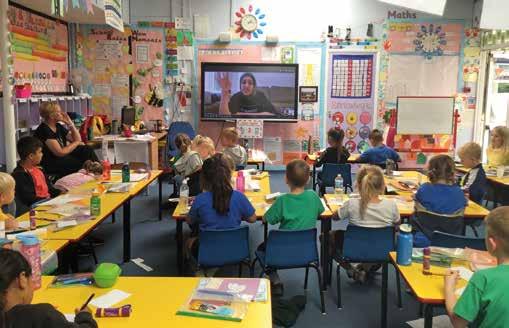
Each week pupils take part in a 40-minute, hands-on STEM experiment over Zoom using only basic resources. These experiments can be arranged at a time to suit your class.
All sessions are delivered by women in STEM to showcase female role models and change outdated perceptions of what a scientist, technologist or engineer looks like.
STEMAZING aims to raise awareness and aspirations in STEM for primary aged children through the six-week programme, which will be delivered in May and June. n To register your class for a free place, visit stemazingltd.com/inspiration-academy Deadline to register is midnight on 3 March.
Happier and healthier school runs
THE 2023 Sustrans Big Walk and Wheel, in which schools compete over two weeks to make the most journeys by walking, wheeling, scooting and cycling, is due to take place on 31 March.
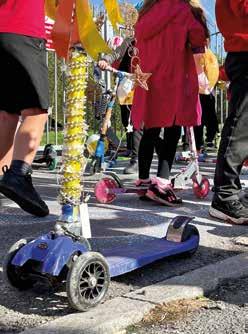
Xavier Brice, chief executive at Sustrans, the UK’s largest walking and cycling charity, said: “This is a fantastic opportunity for parents and pupils to enjoy the fun of a healthier and cheaper school run. Every short car journey swapped for an active alternative helps cut pollution for a cleaner environment and healthier, happier communities.”
Half of all UK pupils worry about air pollution near their school, a Sustrans survey found. During the 2022 challenge, over two million active journeys to 1,519 schools took place, which are estimated to have saved 1,335 tonnes of CO2 and 2,984kg of NOx emissions.
n Visit bigwalkandwheel.org.uk
MEET the Ringmaster, Lexi the Juggler, Tom the Tiger, Jim the Joker and Bob the Strongman as they introduce you to their favourite tricks.
Created by learning disability theatre company DIY Theatre, Circus Tricks! is a music and drama project providing a range of ways for children and young people with learning disabilities to participate in arts activities. The free, accessible and fun animated videos and accompanying educational resources can be accessed and enjoyed by schools, groups, families, and individuals at home or in the classroom or other youth and arts settings.

n Visit diytheatre.org.uk/show/circus-tricks
Supportive space for educators
FOUNDED by former headteacher Alison Kriel, Above & Beyond is a social platform with a mission to ease the ever-growing pressures on educators’ wellbeing. It offers a space for them to come together, away from the pressures of other social media networks, to share ideas, collaborate and celebrate their successes. The platform is free to use (although additional features may incur a cost) and takes safeguarding and inclusivity seriously to allow the open sharing of ideas.
n Visit aboveandbeyond.education

Noticeboard educate Your magazine from the National Education Union (NEU) 45
A STEMAZING Inspiration Academy session live
Circus Tricks! young leaders Amy (left) and Scott
BE PART OF THE DRIVE FOR POSITIVE CHANGE


As the UK’s leading educational anti-racism charity, we are delighted to announce the official launch of our Education Hub. Here you will find free access to our educational resources, and step-by-step, guided lessons and activities so that you can promote anti-racism among your learners.



While Show Racism the Red Card delivers training directly to more than 50,000 individuals per year, we also understand that there is a huge benefit to schools and other educational settings having access to our resources, so that you and your learners can be part of the discussion for driving positive change.






SCAN NOW OR VISIT THEREDCARDHUB.ORG
# REDCARDHUB SUPPORTED BY
THIS stunning photograph was taken by Anselm Gallagher from Hertfordshire.
Anselm says: “In the 1990s, I worked as a freelance photographer before returning to teaching. Over 20 years later, I am semiretired, doing some supply work and I have resurrected my passion for photography.
WIN!
Send us your photo to win a £20 book token
“Some of my work from the ‘90s is featured on The British Culture Archive website. I specialise in black-andwhite street photography.”

If you are a keen photographer, why not send your pictures to us at educate@neu.org.uk They should be large and high resolution, accompanied by 50 words telling readers about its subject. We send a £20 book token to each featured so don’t forget to pop your address on the email too.
What’s in your lunchbox?
Spanish paella serves 2-3

Ingredients
Saffron strands, large pinch
1 vegetable or chicken stock cube, made up to 600ml
3 tbsp olive oil, plus extra for drizzling
1 onion, finely chopped
3 garlic cloves, finely chopped
1 red pepper, deseeded and chopped
2 tsp paprika
250g Spanish paella rice
4 medium tomatoes, roughly chopped
75g frozen peas
250g cooked prawns with shells on, thawed if frozen and rinsed
Small handful of flat-leaf parsley, chopped, to serve
Lemon wedges, chopped, to serve
WIN!
Send
Method
1. Stir the saffron strands into the stock and set aside to infuse while you prepare the rest of the paella.
2. Pour 1 tbsp of oil into a pan, add the
chopped onion and garlic and stir-fry for 4-5 minutes until softened and just starting to colour.
3. Stir in the pepper and paprika with the remaining oil and stir-fry for a further 1-2 minutes. The pan should have lots of crispy, brown bits on the bottom, which will all add flavour.
4. With the heat still quite high, stir in the rice so it is well coated in the oil, then pour in the saffron-infused stock, plus 450ml of boiling water, scraping up the sticky brown bits from the bottom of the pan with a wooden spoon.
5. Add the chopped tomatoes, then cover the pan and cook on a medium heat for 10 minutes, stirring once or twice.
6. Scatter the peas and prawns over the top, cover again and continue to cook for a further 5-10 minutes, or until the rice is just cooked
and most of the liquid has been absorbed.
7. Remove the pan from the heat and leave to rest for 5 minutes.
8. Stir a few times to mix the ingredients, season to taste and scatter the chopped flatleaf parsley.
9. Serve with lemon wedges and an extra drizzle of oil if you like.
Photo opportunity
Miriam Martinez, a modern foreign languages teacher in Milton Keynes, says this Spanish paella recipe is delicious, and there will be “plenty of leftovers to include in your lunchbox”.
Don’t
to attach
educate Your magazine from the National Education Union (NEU) 47
Email your recipe to educate@neu.org.uk with LUNCHBOX in the strap line.
forget
a picture!
us your recipe to win a £20 book token
Quick crossword
Across
1 Novel by Anna Sewell (5,6)
9 Stuart ___ : England test cricketer who is a right-arm seam bowler (5)
10 ___ Gadot: Wonder Woman actress (3)
11 Yoga posture (5)
12 ___ Page: co-founder of Google (5)
13 Greek philosopher and noted Cynic (8)
16 Hard shell of a turtle (8)
18 ___ Nash: US poet known for his light verse (5)
21 ___ Cup: biennial golf competition (5)
22 Tree with serrated leaves (3)
23 Valletta is the capital of this country (5)
24 Small tree with red berries (8,3)
Down
2 Country whose capital is Beirut (7)
3 Musical based on a Christopher Isherwood book (7)
4 An alloy of copper and tin (6)
5 Paula ___ : former judge on American Idol (5)
6 ___ Woods: golfing star (5)
7 French Impressionist painter (6,5)
8 David ___/___ : British Prime Minister in the 20th century (5,6)
14 Manama is the capital of this country (7)
15 Bicycles for two people (7)
17 Deciduous flowering shrub (6)
19 Film about a big-eared elephant (5)
20 Michael ___ : British composer of operas and movie scores (5)
Easy
Last issue’s (Jan/Feb 2023)
Easy, Medium
1 - Novel by Anna Sewell (5,6)
9 - Stuart ___ : England test cricketer who is a right-arm seam bowler (5)
10 - ___ Gadot: Wonder Woman actress (3)
11 - Yoga posture (5)
12 - ___ Page: co-founder of Google (5)
13 - Greek philosopher and noted Cynic (8)
16 - Hard shell of a turtle (8)
18 - ___ Nash: US poet known for his light verse (5)
21 - ___ Cup: biennial golf competition (5)
22 - Tree with serrated leaves (3)
23 - Valletta is the capital of this country (5)
24 - Small tree with red berries (8,3)
Medium
Down
2 - Country whose capital is Beirut (7)
3 - Musical based on a Christopher Isherwood book
Answers at bottom of page 49
4 - An alloy of copper and tin (6)
5 - Paula ___ : former judge on American Idol (5)
6 - ___ Woods: golfing star (5)
Sudoku solutions will feature on this page next issue.
7 - French Impressionist painter (6,5)
8 - David ___ / ___ : British Prime Minister in the 20th (5,6)
14 - Manama is the capital of this country (7)
15 - Bicycles for two people (7)
17 - Deciduous flowering shrub (6)
19 - Film about a big-eared elephant (5)
20 - Michael ___ : British composer of operas and movie (5)
Difficult
48 educate Your magazine from the National Education Union (NEU)
1 2 3 4 5 6 7 8 9 10 11 12 13 14 15 16 17 18 19 20 21 22 23 24
Across
9 2 6 1 4 5 2 6 8 1 4 7 2 6 8 6 1 5 9 6 4 8 1 4 6 2 7 7 4 8 2 6 2 9 3 7 5 3 1 9 2 1 3 6 5 1 7 9 4 9 2 5 4 1 4 9 1 5 3 7 1 6 9 6 9 2 1 5 3 8 4 4 2 9 1 7 3 2 8 5
Sudoku
sudoku solution
and
4 7 5 8 1 9 3 6 2 6 2 8 7 4 3 5 1 9 1 9 3 6 5 2 8 4 7 5 4 1 9 2 7 6 3 8 7 6 9 3 8 5 1 2 4 3 8 2 4 6 1 7 9 5 9 1 7 2 3 8 4 5 6 2 3 4 5 7 6 9 8 1 8 5 6 1 9 4 2 7 3 9 4 1 5 6 2 3 7 8 2 8 3 7 9 1 5 4 6 7 6 5 8 3 4 2 9 1 6 1 2 9 4 8 7 5 3 4 3 8 1 7 5 6 2 9 5 9 7 6 2 3 1 8 4 8 2 4 3 5 6 9 1 7 3 5 9 4 1 7 8 6 2 1 7 6 2 8 9 4 3 5 3 5 6 9 7 8 1 2 4 7 9 4 1 2 6 3 8 5 1 2 8 5 4 3 7 9 6 6 4 7 8 1 9 5 3 2 5 1 9 7 3 2 6 4 8 8 3 2 6 5 4 9 1 7 2 6 5 4 9 1 8 7 3 4 8 1 3 6 7 2 5 9 9 7 3 2 8 5 4 6 1
(from left:
Difficult)
Prize crossword
WIN!
A £50 Marks & Spencer voucher
Across 7 Class dances with rickety pole – falls over! (9)
8 Poor chap consumes last of ripe fruit (5)
10 A lesson including a variation characteristic of the time of year (8)
11 Explanation concerning a boy of yours (6)
12 & 13 How a nice line is broken occasionally (4,2,1,5)
15 If school is redesigned without chapel initially, it could be unwise! (7)
17 It might be unstated without a college pupil (7)
20 New version of Braille used by every centre is trustworthy (8)
22 First 50% paid gets part of book (4)
25 Digit more derived of feeling? (6)
26 Successful exam result takes very long time with book extracts (8)
27 Some hope a ceasefire will bring this! (5)
28 Pay no attention to awful D grade, sir! (9)
Down
1 Number who fall asleep before end of lesson? (5)
2 Girl in goal is onside (6)
3 Dogs chew up Lisa’s pen (8)
4 Fresh miracle required to get something back (7)
5 Disengaged head of department cheated badly (8)
6 Gosh, Colin is wild about education! (9)
9 A tune turns up in operatic song (4)
14 Undercover spy gains new clues to atomic components (9)
16 As relaxed as a dial, literally? (4-4)
18 Attempt to include a troublesome child in woven picture (8)
19 Unexpectedly praised for complete lack of hope! (7)
21 Graduate on road to becoming Eisteddfod winner (4)
23 Country house has golf and area for target practice (6)
24 To gain knowledge could be nearly endless (5)
Last issue’s (January/February 2023) prize crossword solution
This issue’s quick crossword solution (p48)
educate Your magazine from the National Education Union (NEU) 49
your completed crossword, with your contact details, to: March/April crossword, Educate, NEU, Hamilton House, Mabledon Place, London WC1H 9BD, or email a photographed copy to crossword@neu.org.uk. Closing date: 31 March. The winner and solution of this prize crossword will feature on this page next issue.
Send
Across 1 BLACK BEAUTY 9 BROAD 10 GAL 11 ASANA 12 LARRY 13 DIOGENES 16 CARAPACE 18 OGDEN 21 RYDER 22 ELM 23 MALTA 24 MOUNTAIN ASH Down 2 LEBANON 3 CABARET 4 BRONZE 5 ABDUL 6 TIGER 7 CLAUDE MONET 8 LLOYD GEORGE 14 BAHRAIN 15 TANDEMS 17 AZALEA 19 DUMBO 20 NYMAN
123 56 4 78 9 10 11 12 13 14 15 16 1718 19 20 21 2223 24 25 26 27 28
Across 1 CHEMISTRY 8 HEARTS 9 CLARET 12 SODA 13 FEELS 14 LIME 17 REMAINS 18 REALIST 19 NIPPERS 22 GREMLIN 24 MOBS 25 CHAIR 26 FAIR 29 BISTRO 30 THEMES 31 PRISONERS Down 2 HARD 3 MASTERS 4 SECULAR 5 REAM 6 SELDOM 7 GEMINI 10 ASTRONOMY 11 CENTENARY 15 TIMES 16 MATES 20 PUBLIC 21 SCHOOLS 22 GLISTEN 23 LEAVES 27 STAR 28 GEAR
to last issue’s
–
Thirsk
Congratulations
winner
Jill Wood from
The wonderful world of wetlands
Fact file
Janet Clarke is a retired primary teacher, joint health and safety officer for Hounslow NEU, and volunteer for the Wildfowl and Wetlands Trust at London Wetland Centre. Visit wwt.org.uk

WETLANDS are Earth’s most diverse ecosystems, coming in all shapes and sizes – from your garden pond to the Pantanal of South America, the largest in the world.
However, although our planet is 70 per cent water, less than 0.23 per cent is fresh, unfrozen and accessible. Yet 40 per cent of all species, including us, depend on it for life. Wetlands can store twice as much carbon as rainforests but, thanks to us humans, are being lost three times faster.
These are just some of the facts that I have learnt over my years as a volunteer for the Wildfowl and Wetlands Trust at London Wetland Centre, an urban oasis in Barnes, south-west London.
I began volunteering here as a member of the visitor engagement team when we first opened to the public in May 2000. My roles include spotlight talks and meet, greet and roam sessions. Talks may be on topics such as what is a wetland and how and why the centre came to be; and how wetlands can mitigate the effects of climate change and how we can help. Our bird of the day talk focuses on our
living collection to tell the story of our work in monitoring and managing threats to wetlands and wetland species and the people who depend on wetlands for their livelihoods.
One of our core messages is conservation through education and our brilliant education team has, like education teams across the trust, been running a free programme for schools called Generation Wild (see below). It’s great to see and hear the enjoyment of those children who may not otherwise get a chance to visit.
Why not become a wetlands volunteer?
The pandemic has made us more aware that being around nature makes us physically and mentally healthier – and wetlands are great places to visit for that.
Volunteering at a wetland centre can be cold, wet and tiring but it’s always rewarding. So, visit a wetland near you soon – or become a volunteer at one and help spread the word about their importance for wildlife and people. n Visit wwt.org.uk/join-and-support/volunteering
Free access to wetlands near you with Generation Wild
GENERATION Wild is a free programme aimed at providing primary children in disadvantaged areas around the UK the opportunity to connect with nature. Research has shown that a connection with nature has huge positive benefits to children’s mental and physical wellbeing,

concentration, behaviour and attainment. Through an engaging narrative and a specially designed activity trail, children will be able to explore the natural world around them wherever they live.
Generation Wild is offered free at seven wetlands centres, including London
Wetland Centre, based on a percentage of pupils registered for free school meals. All participating children also receive a free family ticket to the centre so they can return with their families, and access to a website full of activities local to them. Visit generationwild.wwt.org.uk
Final
word
Generation Wild at Slimbridge Wetland Centre, Gloucestershire
educate Your magazine from the National Education Union (NEU) 50
PHOTO by Nigel Wilson/WWT
WE'VE BEEN HELPING TEACHERS SAVE TIME FOR OVER 30 YEARS
WHY CHOOSE TASC?
WE LISTEN, WE ACTION, WE DELIVER.
CUT DOWN ON ADMIN DUTIES
CREATE REPORTS AT THE TOUCH OF A BUTTON


If our clients tell us they need their software to do a certain thing, we make it happen for them
If they need something to do more, or less, we create that for them.
If you ’ re looking for a new way of managing your school's data that saves you time, evolves with your needs, and helps you get a grip on your data management, we can make that happen
SIMPLIFY DIFFICULT TASKS
BOOK A FREE DEMO
MAKES COMMUNICATION EASY, IN-SCHOOL AND OUT

sales@tascsoftware.co.uk
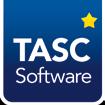
WWW.TASCSOFTWARE.CO.UK
Reading Plus is the online reading development programme designed to improve pupils’ fluency, stamina, and comprehension.
Reading Plus e icacy study in partnership with Derby Research School and Spencer Academy Trust.

Reading Plus pupils achieved on average:
All pupils: 50%
increase in their results from the first to the last test.
SIX-MARK
increase on their scaled score ending with a pass of 102.
Pupil premium pupils: 96% more progress than control schools across the academic year.
EIGHT-MARK
increase on their scaled scores finishing with a pass of 102.
schools used Reading Plus schools did not use Reading Plus
READ THE FULL STUDY HERE
READINGSOLUTIONSUK.COM
OUT MORE
FIND
www.readingsolutionsuk.com | 0191 389 6078 | info@readingsolutionsuk.com *In a Reading Plus study of 470 Y6 pupils over the 2021/22 academic year.











































































































































 Winnie The Pooh
Winnie The Pooh







 Illustration by Dan Berry
Illustration by Dan Berry


























































































